#imagine missing MUNICH! MUNICH OF ALL CITIES ITS MUNICH!
Text
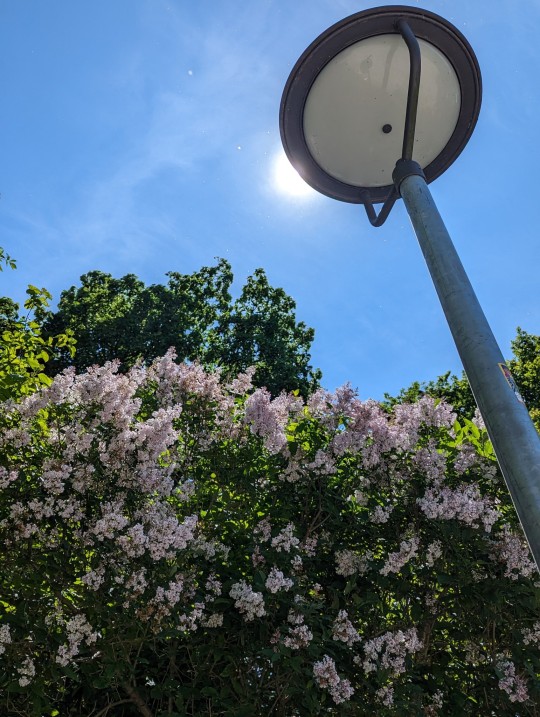


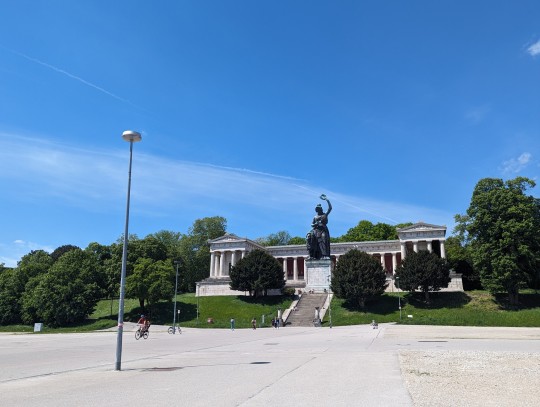
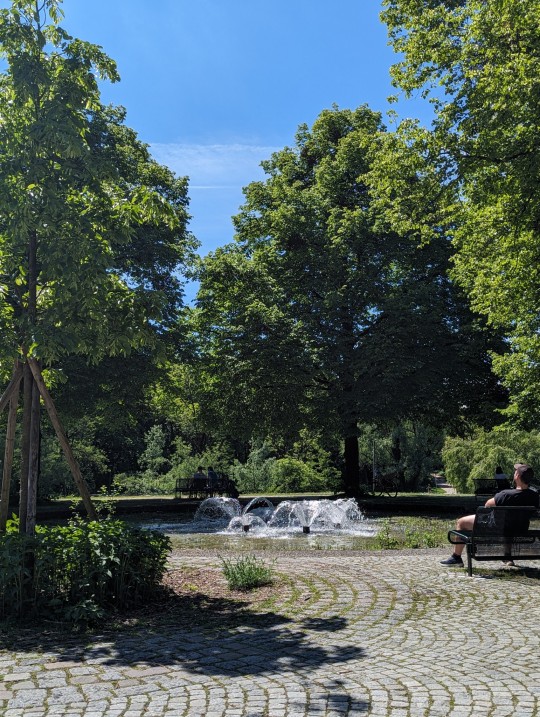
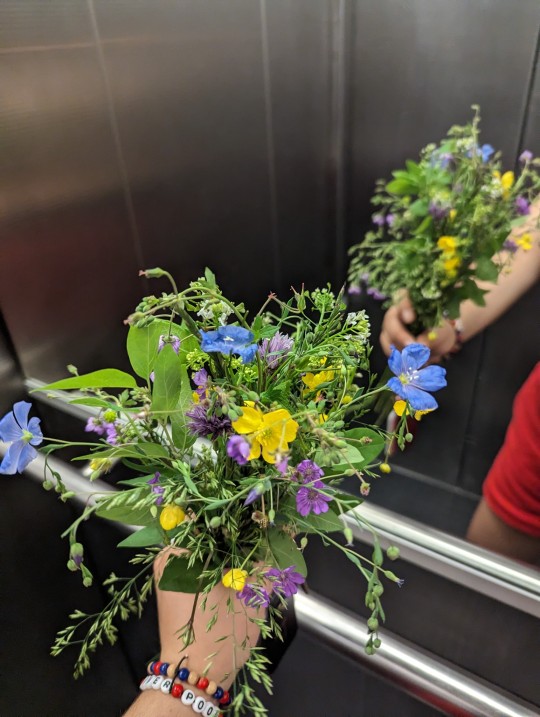
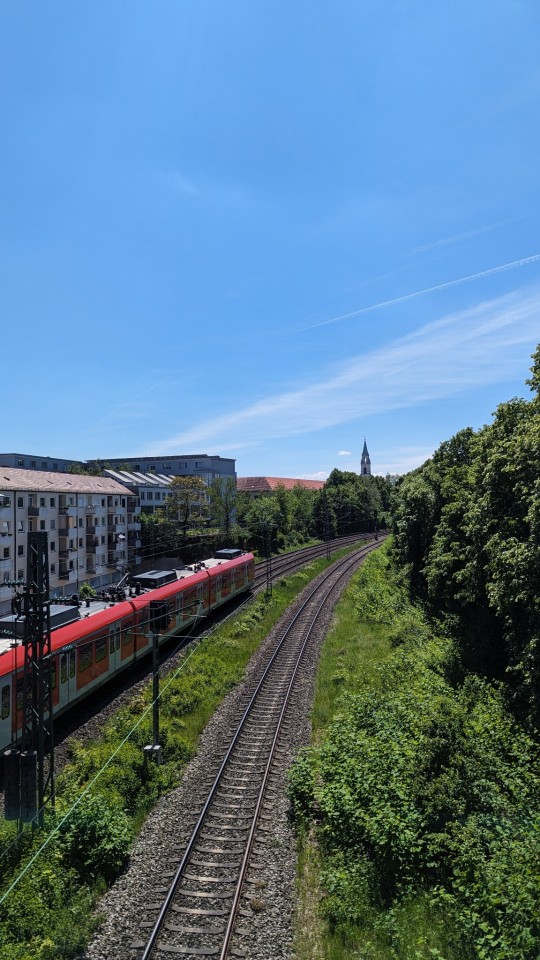

Meine ewige Baustelle <3
#imagine missing MUNICH! MUNICH OF ALL CITIES ITS MUNICH!#own pics#sham!s rambles#oh also happy mothers day :) because im a cheap fuck i just picked my mom a bouquet<3
5 notes
·
View notes
Text
Gotham Tales-Catwoman
The Isis Eye of Cambyses was a wonderful pick. At the Battle of Pelusium, the Persians under Cambyses II defeated the Egyptians by placing cats in front of their army. The Egyptians therefore hesitated to attack. Cruel, but smart. I had a dream where we on a cruise liner, Bruce and me. Sailing away from all this. But that was all it was. A dream.
I’m sure I would have been able to find something in France, even try my luck getting in and out of the Louvre. The Alte Pinakothek in Munich, perhaps. I could try the Neue Nationalgalerie, The Seccession Building in Vienna, or the Kunsthistoriches. Maybe we’d be in London, and I’d try my luck at a gallery there. Mr Wayne would mysteriously donate an item from the British Museum back to Greece or Egypt? No, the columns are too big. But I would send a pretty little item to the Greek Consulate or Embassy. I wish I had a contact there who would send things in the diplomatic bag.
Well, a woman can dream.
Back to the Eye. First, I had to ensure it wasn’t a fake. Magpie might have made a lethal copy of it. Also, didn’t want Ivy or Harley to get to it now, but the former is missing, and the latter is partially in that League thing I hear about. None of that for me. Penguin had his eye on the statue of Isis but got his dynasty wrong. He was off by a century, apparently. Not that the Gotham Museum disagreed. They promised him a review and said they would return promptly. He reminded them of a little bit of history.
I came for the cat statue, but there was another thing there which caught my eye. Whilst I wouldn’t usually go out of my way to steal multiple things, the necklace with the jet mourning stone from Whitby. 1830s/1840s, according to the inscription. Whilst Victorian mourning pieces are common, my friend at the antiques store should be pleased with its quality.
It's of vital importance to keep a balance. We don’t want to give off too much of an air of wealth, but we don’t want to look poor, do we? Thankfully, Mike doesn’t ask personal questions. Did I inherit the jewel, find it in an attic or what? And he gives a real good price. He doesn’t just take and only prefer serious things. ‘I mean, we do get very few Victorian working-class clothes, you know. Because they were all worn through. We get the Sunday best.’
Hey, we all got to make a living. You do your way of taking back the city, I’ll do it my way. I am a tiger, a lioness. A lioness hunts more than the man; they are the mothers as the men lie back. They are the real deal. You thought Poison Ivy trapping a man in her vines or paralysing him before she Lizzie Borden’s him with an axe is bad? Nope. Lionesses, bitch. Here me roar.
Maybe Nightwing is interested in someone else. After all, he split from Daddy. Imagine how well we can work together. Try working with Mummy for a bit.
Another lady is swooping down. I hear her. Footfall as soft as those of a kitten.
A hand on my shoulder.
‘Hand it over.’
Sorry, girl. I only hand it over for. I turn to face Batgirl, wrap my whip around her neck, and keep her upright to look her in the eye. I wonder how much Penguin would pay for your utility belt, sweetie. Ivy would also be intrigued by it, I’m sure, not that we get in contact much (She’ll get back to me if I can send in a jungle cat, though). Ivy would certainly enjoy being able to combat Batgirl, but that involves finding a way to trade the belt, and that lady has no interest in ransom.
Batgirl grabs my hands, twirls me around.
‘Nice try, Selina, but not tonight.’
Oh…
‘There was a man in the alley off 42nd Avenue. Cuts to his face like claw marks. Then he had his eyes pierced. Why?’
Oh, Batgirl. What would you do if you saw a man doing what he was doing to a woman? He sure wasn’t collecting for charity.
‘They don’t know if they can restore his sight.’
Too bad. He should have thought of that. Doesn’t that Huntress woman use a crossbow anyway? If you excuse me.
‘We’ve got you down for theft. I didn’t think we’d put you down for manslaughter. If he dies, the charge will be upgraded. Then you, um, grabbed the woman around the face, criticised her for waiting for the big strong Batman to rescue her, and took a Benjamin out of her purse?'
I’m going. Talk to the tail.
‘You’re going nowhere.’
He’s standing right in front of me. I hand it over for him. He gives to Batgirl, who slips away. I would have thought she would in turn hand it on to one of the Bat-boys, but it’s her that leaves to return to the museum. And so, I’m standing there. No conversation tonight, it seems. I try the alluring eyes, but nothing from him.
He goes his way, I go mine. A ship’s horn blares somewhere. A cruise liner heads away.
Maybe, we could go to Paris.
But he’d never give this up, my dark prince charming.
I’d give this up the moment he does.
That means never.
Until the next night. Whenever I see that signal, it’s date night.
Oh, well. Like I said, I am the lioness.
Hear me roar.
0 notes
Text
a short epilogue to wrap this fic up! thanks for sticking with my sporadic writing schedule <3
ship: felix x ace
warnings: none
word count: 920
[previous]
Where there’s smoke, there’s fire (part 9) (final)
‘…we kindly request you make some minor corrections in time for our meeting tomorrow. First, the windows—'
Felix leans back in his chair and lets out an audible sigh. It looks like he’s pulling another all-nighter today, since the project manager didn’t deem it important to inform him of these drastic design changes earlier.
He looks out of his office window into the city streets, the grey autumn rain perfectly matching his mood as of late. He’s fallen back into a rut of working long hours in the office, only to go home for a meager hour of free time before falling asleep and doing it all over again.
It wouldn’t be as bad if his apartment didn’t feel so empty. It took some time to get used to his ex-girlfriend not being around, and now the only other person stopping by Felix’s apartment is the housekeeper he was forced to hire to keep up with chores.
Maybe he should try another dating app. His track record of online dating has been absolutely abysmal in the last few months, only having had the courage to reply to a handful of messages that mostly went nowhere. The couple of dates and even fewer times he invited someone home just left him feeling underwhelmed. Which is probably for the best, because he wouldn't have time for a relationship anyway.
…Or that's what he keeps telling himself to dull the pain of lonely nights where his bed feels cold and empty.
Trying to shake his depressing thoughts, Felix looks back to the computer screen and starts typing a passive-aggressive reply to his project manager. He still has a dozen urgent emails to respond to before he can even start working on tomorrow’s revisions, and he should probably order takeout to the office at some point since he’s going to be here for a while.
Felix’s phone beeps next to his keyboard and he lets out a grunt of annoyance at yet another distraction. He reaches for the device, fully intending to silence and flip it face-down to prevent it from interfering with his work. He spares a cursory glance to the message displayed on the screen—
And immediately freezes upon reading who the sender is.
It feels surreal to see the name he’s been trying to forget for months. He hasn’t quite been able to bring himself to delete the contact, at times even hovering over the call button with shaking fingers before pulling himself together.
Felix’s heart feels like it’s about to leap from his throat and he closes his eyes and takes a few deep breaths. His mind is running through a hundred different scenarios while he clutches his phone in a death grip, work stress completely forgotten in favor of trying to muster up enough courage to open the message.
After a few minutes of silent panicking and near-hyperventilating over a simple text message, Felix finally convinces himself to read its contents.
‘Say, if someone happened to be in Munich for oktoberfest next week… would your offer still stand? ♠️’
Felix’s heartbeat is pounding in his ears and blood rushes to his face as the realization sets in.
Ace is coming to see him.
Felix should probably be skeptical of the impromptu visit, especially after the radio silence of the last three months. Still, he feels hope spreading through his chest and his near-permanent frown slowly quirking up into a smile.
He could easily reschedule some of next week’s meetings, a few annoyed clients a small price to pay for the opportunity to introduce Ace to the festival. Felix can already imagine it, walking through the festival tents together trying different beers and snacks, occasionally stopping to participate in a drinking song. They’d pick up right where they left off months ago, Ace making flirty jokes about Felix’s traditional Lederhosen, sharing laughs and stories before calling it a night and going back to Felix’s apartment.
In the midst of his daydream, Felix suddenly realizes he’s already started writing a response. Normally, he takes way too long to text, composing and re-structuring his messages numerous times. But this time, there’s no hesitation when he hits “send”.
When he gets a response not even a minute later, Felix is glad for the late hour since it means nobody has to see their boss alone in his office snickering like a schoolboy.

As it turns out, one week isn't nearly enough for Felix to get bored of Ace's company. After a week of festival-going, sightseeing and curling up on the couch to fall asleep to a movie together, Felix feels like he's found a missing piece in his life.
Saying goodbye, however, is just as difficult the second time around. Despite having already made plans for his next trip to Germany, Ace seems just as reluctant to leave as Felix is to let him go. Only this time, Felix allows himself to admit how much he’s going to miss the man.
Seasons come and go and Felix gets used to the new routine of monthly visits along with phone calls at odd hours of the day across their time zones. Through compromises on both sides, Ace's stays gradually become more frequent and their short time apart much more manageable.
And one year later, Felix’s unhealthy working habits slowly start to become a thing of the past. Because every day, he gets to return to an apartment that finally feels like a home, with both of their names on the front door.
17 notes
·
View notes
Text
Champions League 2020-21: Who will be kings of Europe? Our experts' predictions
Fifty eight days after Bayern Munich lifted the trophy in Lisbon, the Champions League is back.
Last season's disrupted competition ended with an unlikely final four of Bayern, Paris St-Germain, Lyon and RB Leipzig.
So who will triumph this time? And who will be the surprise packages? We asked our European football writers to make their predictions.
Champions League groups in full
Everything you need to know about this season's Champions League
Can you name every team in this season's Champions League?
If you are viewing this page on the BBC News app please click here to vote.
Andy West, Spanish football writer
What are the prospects for the Spanish sides?
Real Madrid are, of course, always dangerous in this competition and will have added motivation after failing badly in the past couple of years with consecutive last-16 exits.
Barcelona have started the season brightly but realistically the squad is too shallow and blighted by too many flaws for them to be considered among the favourites.
Atletico Madrid, though, could go a long way: they will be strong at the back as always, and if the new strike pairing of Luis Suarez and Joao Felix fulfils its potential they'll be hard to stop.
And Sevilla? Underestimate them at your peril.
Who is your tip to win the Champions League and why?
Right now it's hard to look past Bayern Munich, considering how superior they were to every other team at the end of last season.
But winning the competition two years in a row is notoriously difficult, and I have a feeling we'll see a very strong challenge from the team who historically like to believe they own this competition: Real Madrid.
Zinedine Zidane can call upon genuine world-class quality throughout the squad and has plenty of match-winning options in attack, especially if Eden Hazard can get fit, stay fit and start to show his true ability. So I'll take Real Madrid.
Which team could be the surprise package?
Sevilla have made the Europa League their own, winning it four times since 2014. And under the leadership of canny coach Julen Lopetegui, they look ready to step up to the Champions League. The Andalusians don't have the quality in attack to be potential winners, but they could go deep into the knockout stages.
Constantin Eckner, German football writer
What are the prospects for the German sides?
Bayern Munich addressed the issues regarding their squad late in the transfer window and remain among the strongest teams in Europe. They are capable of defending the title, but it is more likely we will see a slight drop in performance this season.
Borussia Dortmund should win their group and reach at least the quarter-finals if they manage to keep the defence healthy.
RB Leipzig could battle Manchester United for second spot in Group H. Even without Timo Werner, last season's semi-finalists are tough to beat thanks to Julian Nagelsmann's analytical mind and a squad full of highly athletic players.
Borussia Monchengladbach should see their participation in this year's competition as a chance to learn and grow.
Who is your tip to win the Champions League and why?
I don't see a clear-cut favourite this year, as the two previous winners have to deal with some issues that might hinder them from winning it again.
So my money is on Real Madrid. They are the total package with a mix of veteran players and rising stars, and an experienced coach on the sidelines.
Federico Valverde, Martin Odegaard and Vinícius Júnior represent the new generation, while Karim Benzema, Toni Kroos and Sergio Ramos have enough left in the tank to get one more Champions League trophy.
Zidane might not be the tactical genius that some of his peers are, but he knows how to manage a tight schedule and guide a team through the obstacles of a knockout stage.
Which team could be the surprise package?
Borussia Dortmund have the raw talent to be the dark horse in this year's Champions League. They are able to beat any team in the world on a good day and will only get better, as most of their key players are fairly young.
Phil McNulty, BBC Sport's chief football writer
What are the prospects for the English sides?
Liverpool, with their past record of success, are England's best prospect to win the Champions League. Manchester City have the talent but there is something about this competition that always seems to trip them up. Is it lack of belief? Is it Pep Guardiola's tactical mistakes?
I can see Chelsea making it out of a group that is relatively kind but in their current form and condition I do not see Manchester United getting anywhere near the knockout stage when faced with the likes of PSG and RB Leipzig. Things can change in that time for United, but they would have to change a lot.
Who is your tip to win the Champions League and why?
At this stage I would say my two favourites would be Liverpool and the holders Bayern Munich.
Liverpool still look so strong, although they did not get past the last 16 last season when they went out to Atletico Madrid, but now of course they have Thiago Alcantara, such a key figure in Bayern's triumphs.
The usual suspects such as PSG, Barcelona and Real Madrid will be involved but I will go for a straight fight between Liverpool and Bayern - with Liverpool my tip.
Which team could be the surprise package?
Hard to see anyone coming out of the traditional pack but Atletico Madrid, under the inspirational leadership of Diego Simeone, are always a threat, as Liverpool found to their cost last season.
Atletico have had so many near misses with the Champions League but they have added to their squad with Luis Suarez and no-one will want to draw them.
The other possibility? Sevilla - they showed once again what European specialists they are by winning the Europa League.
Ian Holyman, Ligue 1 podcast producer
What are the prospects for the French sides?
It's hardly sticking my neck out to suggest PSG will challenge strongly again.
Yes, they've lost Thiago Silva, but with Marquinhos replacing him in central defence and as captain, and Danilo Pereira's arrival in midfield, Thomas Tuchel's men are stronger and better balanced.
Andre Villas-Boas worked a miracle to get Marseille back into the competition for the first time since 2013-14, but even with Florian Thauvin fit again, the squad looks thin - a helpful draw might see them sneak into the knockout stages though.
Group-stage debutants Rennes will surely struggle with the step up in class, and grabbing third place would be a success.
Who is your tip to win the Champions League and why?
Can you look beyond Bayern Munich? The Champions League is a notoriously fiendish title to defend, but the 2019-20 winners' success in Lisbon in the summer will motivate, not sate, them. They have not stood still since either: Eric Maxim Choupo-Moting (don't laugh!) is great back-up to Robert Lewandowski, and though Thiago has left, Bayern already had an upgrade in Joshua Kimmich.
Their veterans, Manuel Neuer and Thomas Muller, enjoyed one of their best seasons last term, and young talents such as Serge Gnabry and Leroy Sane will only keep improving.
Hansi Flick's men will again be the team to beat.
Which team could be the surprise package?
They've been drawn in the toughest section of all, but Istanbul Basaksehir will be no meek victims of Group H. The Turkish champions - that already says something about their quality - have former Manchester United defender Rafael and ex-Liverpool man Martin Skrtel at the back, while ex-West Ham United, Newcastle United and Chelsea forward Demba Ba is up front.
Daniele Verri, Italian football journalist
What are the prospects for the Italian sides?
It is difficult to imagine an Italian club winning the Champions League.
You can't rule out a team fielding Cristiano Ronaldo but Juventus have a young manager in Andrea Pirlo, are in the process of rejuvenating their squad and lack quality in midfield. Their quest to end a 24-year wait will continue.
Inter proved their worth as they reached the final of last season's Europa League and have since signed Achraf Hakimi and Arturo Vidal. Their focus will be on the league title though, something Antonio Conte sees as a necessary step to form a winning mentality.
Lazio do not have the depth to fight on the domestic and European stage and will struggle to keep up on both.
Who is your tip to win the Champions League and why?
Not even the Oracle of Delphi can predict in October who is to win the Champions League in May! Form, injuries and Covid-19 will all play a role. Will there be another lockdown? Who is going to be the fittest when it really comes to it?
In my opinion, the eventual winner will come from England. Spanish clubs haven't invested enough, a second win for Bayern seems unrealistic and Italian clubs lack that extra bit of quality.
Liverpool and Manchester City, as long as Sergio Aguero recovers and Ruben Dias proves capable of filling Vincent Kompany's boots, are my favourites, with PSG their main danger.
Which team could be the surprise package?
Atalanta already reached the quarter-finals in their maiden Champions League campaign and could do even better.
The Nerazzurri have gathered European experience in the past few years and this will be Gian Piero Gasperini's fifth season in Bergamo. His team play with heart and are a joy to watch. If Josip Ilicic reaches top form they will be a threat to anyone.
‘SOCCERLEGENDS NEWSDESK’
2 notes
·
View notes
Text
Ima
I is for Ima
Ziva is here and then she is nowhere. For now, she cannot reach her.
Tali.
“Ima. Bevakasha. Please come home.”
The broken voice crackles down the line, over thousands of miles, through millions of wires, firing in out of countries and cities. Budapest. Dayton. Munich.
It pings, here and there, everywhere, across a galaxy she does not see. Technology hides her. For now.
“Ima?”
Target acquired. The plea lands, detonates. It shatters Ziva into a thousand more pieces.
This is it. She mourns. Penance. She repents. She repeats.
“I cannot, tateleh.”
Ziva sounds broken. She feels broken.
Her daughter’s six earthly return falls on today but Ziva feels lately she no longer resides in earth’s orbit. Not now, not lately. She exists outside time and space and everything in-between. The months and days separating she from her and her from she feels heavy as it is tangible. She can no longer navigate this pain.
Her daughter’s broken sob crackles the line again. It sends Ziva flying out of orbit.
Ziva is here and then she is nowhere. For now, she cannot reach her.
Tali.
***
“Mazel tov, Ziva.” A cry. Then, a warm weight, suddenly squirming, searching against her breast. “You are an Ima,” Orli implores. Her face swims into view.
Ziva is so tired.
The baby blinks rapidly. Already seeing. Not yet knowing.
“Her eyes,” Orli murmurs. Hesitant. Then, “They are her fathers’.”
Sea-foam, Ziva thinks. A sharp memory breaks through her fog. Sea-foam green.
Ziva is quiet for a long time.
Her own eyes, Orli notes, gaze off across the room. She is so very far away.
.
Later, there is a day where Tali looks up at her. She is smiling. Always smiling. The smell of sunscreen, but also the fig trees growing in the meadow below the hill by their home. And something familiar. Something him.
There’s a toy she is waving. Chocolate smeared on her face. Ziva doesn’t hear the laughter. She notices the change then. She doesn’t hear anything for a few moments.
Her daughter’s eyes. Their daughter, she corrects herself. A daily reprimand.
When did they begin to turn brown?
Not for the first time, Ziva loses him all over again.
***
“Shteki!” A screech, echoing up and down the hallway. Then, “I hate you, Ima.”
She is twelve and this is her new mantra.
Ziva swears she’ll spend her lifetime chasing forgiveness.
Slow yet heavy footfalls reverberate down the hall. A drop of keys from the car they returned home in. A shiny new Volvo, all the amenities. Cautious and careful, the steps continue. Past the slammed door, the discarded school bag with a freshly minted preparatory boarding school’s logo stitched into the navy fabric. Ducky had recommended it. A fine school, indeed.
There’s a pause, a hesitant step over her just like new dress shoes.
Victoria never wore them. Breena had laughed that night, nudging Jimmy, a secret joke hidden in there, somewhere.
They used to have those moments; Ziva had mused. Those moments feel so foreign these days. Years.
Her time since returning home, to her, to him, to this, has been a purgatory if she is to ever know one. She is forever waiting for the other foot to drop.
When he reaches her, Ziva’s forehead has retreated to its resting place as of late; She cradles her head, knees tented and seated against the wall outside their bedroom. Thin, shaking fingers raised to cover her eyes.
Tony sighs as he takes her in. Her curls hide her face from him, anyway. But she must know she can’t hide her tears.
He hesitates, his own mantra on the tip of his tongue. It will do nothing to soothe her in this moment, but he’d be remiss if he didn’t try.
“It won’t be this way forever.”
Ziva’s throat closes, catching and releasing a sob too quiet for him to hear.
Her mantra.
She had said the same to their daughter all those years ago, a broken record on repeat.
Running, hiding. More Running. Her daughter employs her mother’s nature now. It was the only lesson Ziva’s unintentionally, unwillingly, unknowingly, imparted on her.
Ziva is not sure if her daughter wants to be found, least of all by her.
She knows the feeling.
***
“I-ma. I-ma. EEEE-MA”.
A gale of laughter. A first word. Followed by a second and a third. It’s preceded by her first taste of peaches and her first summer rain. It is simple and it is not. Her days are short as they are long. There is no sleep, but the laughter makes up for it, tenfold.
Ziva knows these are the days she will miss.
***
“Ima,” She giggles. “There is a boy.”
Her voice is cautious. A secret. There’s a smile on her lips. Ziva can tell, even over the phone. She imagines Tony’s smile and the dimple on her cheek – a tell of hers that has nearly always betrayed her when deception was on her tongue.
Tony’s eyebrows appear above the paper he, yes, still reads. Her finger pauses on her tablet, an article on Iraq’s rehabilitation comes to a halt at the end of her finger. He is sixty-two now but his hearing is most certainly twenty-twenty.
He reads Ziva’s look, a lifetime of intuition forged by partnership reprimands him even in silence.
A look of warning.
Her voice, nervous. Another giggle. “Do not tell Père. Not yet.” Now, Hebrew. “A secret.”
The papa in question remains silent. The paper has long been retired to his bedside table.
Smiling, Ziva plays along, whispering back down the line to her.
“Does a boy have a name?”
Heart imploding, head exploding, Tony manages a smile. He couldn’t help it. They finally made it here.
.
The phone call ends some time later. He returns to the bedroom, previously vacated while secrets were exchanged, I love you’s whispered across a phone. A serene look adorns Ziva’s face.
“Hey, Ima,” His eyes twinkle. Her breath catches.
Even after all these years.
“You’ve done good”.
She smiles. She is forgiven.
Not Mossad, not on the run.
A retired investigator. A partner.
An Ima.
82 notes
·
View notes
Text
Translation: Kai Havertz portait in ZEIT newspaper (January 2019)
NOTE: Hey guys! This time I tried something new. I translated an exclusive portrait the german weekly newspaper DIE ZEIT did with Kai in January. They interviewed him as well as Kai’s family. Its very candid and has alot of details. I hope you guys like it, since DIE ZEITs writing is usually very difficult - even for germans. And I apologize for spelling errors as usual.
The original text in German
Kai Havertz: the peace itself
(January 23, 2019)
People praise Leverkusens national player Kai Havertz, 19, for his serenity with the ball which put him on the radar of many European top clubs. His parents start to realize that he is likely becoming world famous.
By Jörg Kramer

The most promising german football talent these days picked a table very far behind in an restaurant somewhere in Cologne to order himself some spagetti gnocchi – inconspicuous.
There is no star posturing with Kai Havertz. The 19 year old could even go through as a normal university student; with his bright hoodie and somewhat cheap and not even special occurence.
And with his voice, which has this typical regional dialect, without the typical empty phrases that young football player use to often in order to cover up their meaningless sentences. But people know his face by now. So thats why he doesnt sit right next to the entrance.
He belongs to the celebrities of the football scene. European top clubs are scouting the young men in stadiums, team mates from Bayer Leverkusen praising him and forecasting him to have the potential to become a world star.
He already scored nine goals this season, decided some games by his own and played his first games for the national team. Havertz became the centre of his clubs game by playing at the centre midfield. His role only changed slightly and the importance of his role not at all, since Peter Bosz took over as head coach. He views this very relaxed and talks in an restaurant somewhere in the Belgian Quarter of Cologne about Leverkusen being the „perfect place“ in order to develop as a young player. And thats where he wants to give his all for the last half year ahead. Ooops!
His last half year? That was a slip of the tongue of course, he meant to say the next half year. Because his contract with Bayer is still running until 2022 without an exit clause. But things now are developing in a rapid way which runs parallel to his explosive performance currently. Its just a matter of the perfect timing that someone like him will end up going to Barcelona, Manchester or at least Munich – a choice between summer 2019 or summer 2020 maybe.
Havertz walks over his misspelled sentence like nothing happend. Once in Nuremberg in the middle of a turmoil of an rainy game, it seemed as if he stopped – as if he was reconsidering the situation with him having the ball. Like if somebody pressed a ‚Stop‘-button. And he chiped to ball in an cool and unemoitional and scored.
Coaches and team mates are citizing his body language, he says. So he works on looking more aggresive. He even participates on useless discussions between his teammates and referees after controversial decisions on the pitch, in order to get a penalty for the other team or some revenge. But it doesnt really look good him when he does it, he admits – even after a though tackle or when going after the ball. „I’m a player that shines with his tranquility.“ A nice sentence that gives away his elegante style of play.
Havertz remained an artist on the pitch. Every foul is a sign of weakness. Everytime he gets the ball, which is his job as an offensive player, he never runs into his opponents – he anticipates. „I try to imagine, which options my opponent has, what he would do if I were him.“ He then runs with a planned pass way and he gets the ball.
Havertz learned in the past almost two and a half years all systems and tatics of modern football. Starting with a radical system, almost a raid-strategy under coach Roger Schmidt, by which the goal keeper kicked the ball high and it flew wide over the pitch – almost always directly aimed at Havertz‘ head – because he is 1,88 meters tall.
Then the mixed system under Heiko Herrlich. He always had to look for his team mates before he passed. Now with Bosz, a planfull offensive style with flat passing. He runs through all the chapters. The first began on October 15, 2016.
It was a Saturday. A day where the Havertz family from Mariadorf near Aachen still couldnt realize that their youngest son, will probably end up living off football and perhaps even become famous. They cant really believe it up until today, says Anne Havertz, his mother.
On that day – October 15 – Kai was a youth player, in a big house next to the woods in Mariadorf having breakfast – when suddently coach Schmidt called. Lars Bender, professional Bayer-player who was supposed to play against Werder Bremen that evening, got injured and had to quit. Kai had to come to Bremen, immidiately! His mother drove him to Leverkusen. A special shuttle took him to Bremen. His whole family was sitting in front of the TV that night.
Kai was sitting on the bench as expected. Then, during the 83th minute, the commentator saw already more than the viewes and said: now we are experiencing a debut. Kai Havertz was ready to get subbed. In the real Bundesliga. Anne Havertz said: „Oh my god!“.
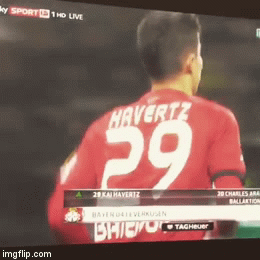
(Credit: Instagram: kaihavertz29)
Kai’s mother, who worked as a lawyer until she got pregnant with her eldest son, came to the restaurant in Cologne one day after Kai to talk about life as a family of an future world star. She brought her husband – Kai’s father, and her daughter Lea, Kai’s sister. The sister is studying marketing and digital media in the city.
People can reach his father in an emergency by dailing 1-1-0. He is a police officer working at the police station 3 in Cologne-West. He says he is really impressed, about how cool and routinely his football playing son manages post-game interviews and how we stays cool when people recognize him in public and everybody is watching,
The Havertz family is still perplexed about a football world where colleagues of their son, order their own cooks to cook for them at home. And whenever he puts his legs into an special bag in order to regenerate. Almost the whole family – except his oldest brother and the dog – are having apple pie and salate and looking back at the stages of his career, which started at Alemannia Mariadorf. Kai skiped two age-groups. He then played with older players than actually intended. Then he transfered to Bayer Leverkusen. All because the scout was tough but not intrusive like the other scouts. By the age of ten, Bayer drove Kai to training sessions three times a week.
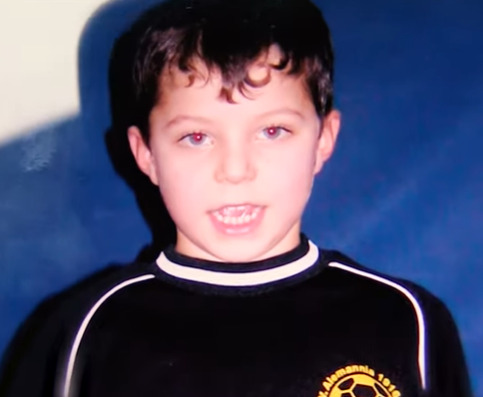
4 year old Kai Havertz (Credit: kicker tv)
He was still among the smallest players in the team by the age of 14. Then suddently - a growth spurt which resultet in issues with his knees and his back. They were responsible for Kai loosing his fixed spot on the team. This was also the hard time because he left home and moved to Leverkusen. The club doesnt have an academy so he stayed at a guest family – the family of the stadium announcer from Bayer, together with two other players. A year later he moved into an apartement with his older brother, until Jan had to move to Nuremberg – he has a marketing job at adidas now.
A lasting memory: endless discussions within the Havertz family about the overarching question: does the boy need a german high school diploma (Abitur)? Will he pass the tests when he is travelling around with his professional teammates?
Kai Havertz attended the Landrat-Lucas-Gymnasium. An elite school of sports where he could skip classes in the morning for training. But he always had to catch up school stuff from the day. Once he played with Leverkusen at the DFB-Cup at Sportfreunde Lotte. He was subbed late, it went into penalities and after the team was eliminated from the cup he arrived home late – at 3am. At 8am he had an English exam.
The family became a team. His mother and sister helped him with biology exams. One day the young football player said to his family, he has no power left anymore. „But he never said: I want to quit!“ his mother insists. This was a breaking point by which his parents thought about quitting and stop pursuing the Abitur. But suddently coach Roger Schmidt intervened and said Kai should pull through. The whole Bayer team will support him.
The Abitur became a factor of will power, a test of life. The school supervisor of Bayer, a former athlete herself, said something memorable: it will shape his whole life if Kai quits school now. Whenever something becomes difficult, if something goes beyond your pain barrier, he will always have this option to quit in his head, that you can just give up.
Kai Havertz choose the pain, the Abitur. Now he will always choose the hard way if the theory of his supervisor holds.
On this January afternoon in Cologne, he is being asked what other job he would have picked if it wasnt for football. He likes the job as a barber, for men’s hairstyle. He smiles. Some curls are hanging on his forehead from left to right. A Barber. He wouldnt have needed an Abitur for that.
He is a genius at football. He won the German junior championship with Bayer and scored 19 goals in 29 games. He got awarded as a Under-19-player as the best of his age with the Fritz-Walter-medal from the DFB. Kai made it onto second place on his position after Marco Reus from Dortmund in a list of the football magazine „kicker“ which they publish every half year – but seven spaces in front of Munich’s Thomas Müller.
Coach Heiko Herrlich says Havertz reminds him of Toni Kroos. Football critic Reiner Calmund compared him to Franz Beckenbauer. His head goals remind him of Michael Ballack. Mesut Özil was always Kai Havertz idol, because of his tranquility with the ball and his ability to read a game. Sometimes Kai misses the final conciseness in front of the goal, which was visible after the recent 0-1 loss against Borussia Mönchengladbach.
Having the ability to remain calm, even when you get tackled is the result of a deep confidence in your own strenghts: screen your surrondings – in short time if necessary – and then make the right decision. Joachim Löw praises Havertz „good orientation“, something he said about Özil years ago. What he means is a certain sense of space on the pitch – an inner compass. Something that has to do with attention and memory. Havertz, who is a master of navigation, doesn’t even need practice. Some creatures have special senses and are able to find orientation on earth through a magnetic field – like migratory birds for example.
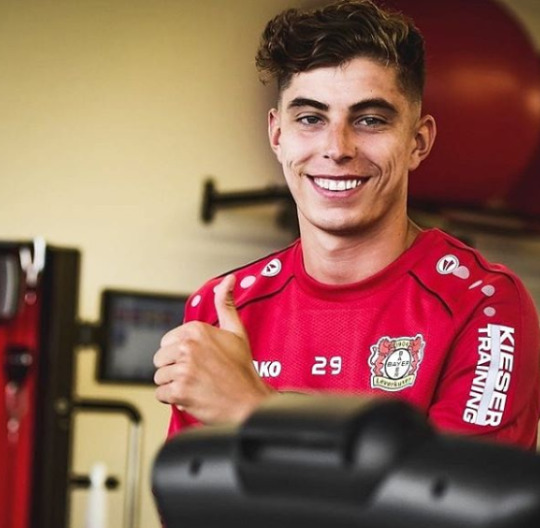
Kai Havertz likes watching Champions League games. And while watching them, there is always a wish inside him to participate as well whenever the big games of the quarter- and semifinals are on. „I think you can only reach that level by going to a top club at some point“ he says.
Mother, father and sister Havertz say, they don’t expect things from him. Something they never did in his career. But if someone asks them, who will follow Kai in a foreign country to get used to everything – they start to think about it. They would alternate. One week his mother would visit, next week his sister and then his grandmother maybe.
Kai Havertz still has a room back home in Mariadorf. Back in the day he used to have posters from FC Barcelona. So it could happen maybe one day, that youngsters in Barcelona will have posters with Kai Havertz on them.
++END++
#kaihavertz#kai havertz#bayerleverkusen#bayer leverkusen#German NT#diemannschaft#DFB Team#dfb#bravertz#julianbrandt
27 notes
·
View notes
Text
Woodcuts in suburbia: melancholy, nostalgia, and resistance
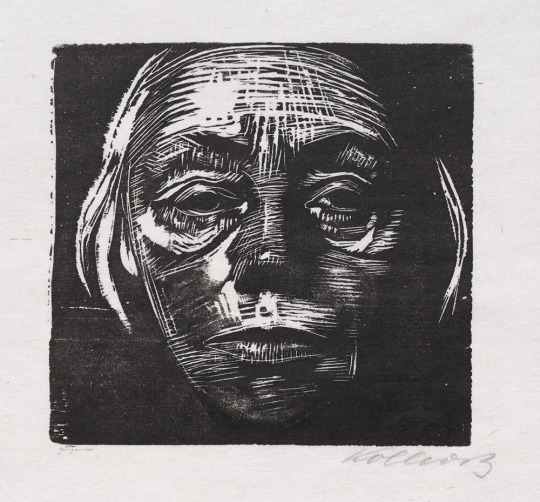
Selbstbildness von vorn, Käthe Kollwitz © 2019 Artists Rights Society (ARS), New York / VG Bild-Kunst, Bonn
I associate woodcuts with a particular aesthetic: they loom from their perch on the bookshelf in the den, next to a collection of Hans Christian Andersen tales, whose worn buckram binding is effusing that sapid antique book aroma which pairs so well with coffee and cake. In the corner of the room, above a worn black leather chair designated for tv-watching and reading, a pathos dangles from its pot, fed by gentle streams of light emanating from the canopy of shade sheltering the backyard garden. On weekends and special occasions, the clinking of cake forks against china is punctuated only by an occasional “delicious!” — direct and accurate. This orchestration produces a distinctly Germanic affect, and one that I associate with the elderly; the particular family room I’m recalling belonged to my next-door neighbors growing up, former members of the Danish anti-Nazi resistance who had emigrated in the early 1960s. While I can’t be sure there was any deeper meaning behind their affinity for the humble woodcut, I do recall the medium’s prominence in their home. For me, something as benign as a flock of geese is represented with a degree of melancholy in these prints' impenetrable black shadows — an inevitability in this generation’s Weltanschauung, that everything beautiful carries with it a degree of pain, a nostalgia for the idea of a more civil world.
These beloved octogenarians were my first choice of role models, and I insisted on seeing them almost every day for the first 8 or 9 years of my life. They were old-school Democrats (or at least, that’s how their values system translated into American) in a largely Republican suburb of a mid-sized Upper Midwestern city. I can still place myself their 1950′s minimal traditional home: running my hands along their walnut furniture with polished nickel handles, greeted by a different antique clock in every room, tick-tocking at various registers, my slippered feet shuffling along a dull, greenish-blue carpet so typical of that era. Nothing in that home was remotely as paired down as today’s sanitized mid-century throwback, and the old neighborhood still retained a smidgen of character unlike contemporary expressions of manifest destiny. Lovingly tended beds of roses, pansies, and bleeding hearts flourished under the shade of maples, walnuts, and red oak.

A young family admires their new home. Between 1950 and 1970, America’s suburban population nearly doubled to 74 million Camerique Archive / Archive Photos / Getty Images
For my neighbors, woodcuts seemed to be a culturally relevant way of displaying eerie alternative landscapes: a flock of geese, a school of fish, a sunset laden with a certain degree of subconsciously expressed Weltschmerz. For me, these woodcuts were inextricably linked to their stories of brazen defiance in the face of terror, which they seldom shared, always with a degree of pain and even embarrassment. Their democratic ideals to which they so proudly clung were the real source of their identity; it was from them that I learned it was OK to be gay, that everyone deserved a home and access to healthcare, that one lives like a society like a neighbor rather than just an individual. But it wasn’t until years after their deaths that I detected any degree of paradox in their suburban American existence, was able to chuckle at their nostalgia for the old country as expressed in their grocery cart (tubs of frozen Coolwhip to be served generously with home-baked apple cake, slices of summer sausage or cucumbers served on squares of cocktail rye, a far cry from the bakeries and delicatessens of northern Europe.)
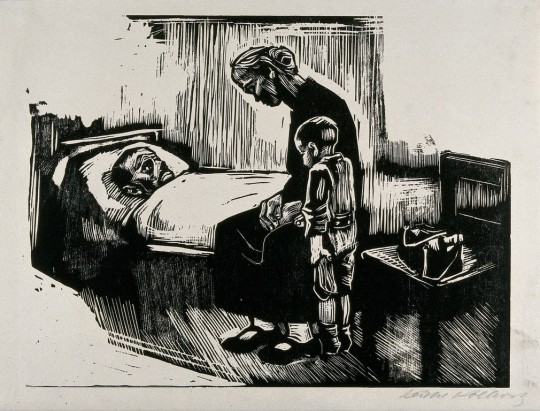
A woman and a boy visiting a man in hospital. Woodcut by Käthe Kollwitz, 1929. Credit: Wellcome Collection. CC BY
While I may associate woodcuts with the interior design choices of an immigrant family in the middle of the last century, its origins predate my concept of history. Woodcutting is thought to be the earliest print technique, originating in 9th-century China, arriving in Europe sometime in the 14th century. Woodcut has been a staple medium for prominent Northern European artists like Dürer since the 16th century. To produce a print, artists carve their image into a block of wood, along the grain, removing the parts that will not carry ink. The surface is then rolled over with a brayer and the image transferred to a sheet of paper through a press. The result in works like Käthe Kollwitz’s Selbstbildness von vorn (1922-1923), pictured above, is nothing short of haunting — well-suited to the violently introspective tone of German Expressionism. If you’re curious about the process, here’s a short demonstration:
undefined
youtube
Phil Sanders, Director of the Robert Blackburn Printmaking Workshop, demonstrates the pressure + ink relief process
Woodcutting became a popular tool of activists in the 1910′s, when thinkers like Ernst Barlach were beginning to use reductionist, anti-naturalist figures to express their dejection at the rise of an alien world. In the case of Barlach, his art was often placed alongside politically charged writing in order to provoke emotional reactions to the realities of uprootedness, inequality, and disaffection in industrialized, urban Europe. It is Barlach’s rather proletariat answer to the questions of modernity, inspired in part by a kind of political realism emerging in Russia, that inspired German artist Käthe Kollwitz to take up the humble woodcut.
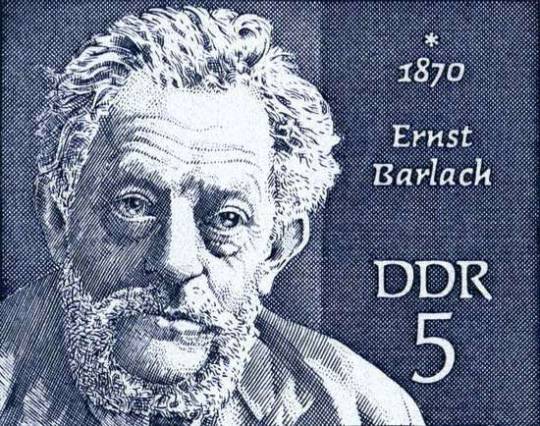
Ernst Barlach, from an East German stamp, 1970. Would he have been pleased with his legacy?
I remember receiving a story on the couch in my neighbors’ den — I was about 10 or 11 — regarding the final days of the war: a fellow member of the resistance had suggested replacing the Dannebrog with the flag of the Danish Communist Party, the DKP, an idea that had shaken my neighbor to his core. For him, resistance had been an act of preservation, a defense of the right to be distinctly Danish, and all that it entailed, in an increasingly international world. How the inability to return to a Denmark before the crimes of Nazism must have felt, I can only attempt to imagine. To this day, I am astounded by my neighbors’ apparent lack of burnout in light of what they sacrificed, their resilience in living out their ideals and inherited melancholia with me under an umbrella on the patio. It seemed that, for them, past and present far outweighed considerations for the future.
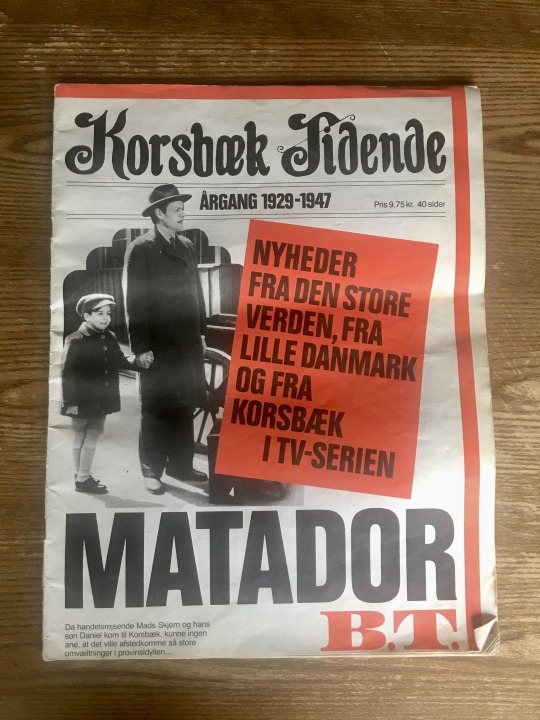
My copy of Korsbæk Tidende (Korsbæk Official Journal), an educational accompaniment to the popular Danish 1970′s and 1980′s tv-series “Matador” about a fictionalized Danish town between 1929 and 1947. I inherited this collection of real newspaper clips that informed events on the show from my neighbor — I assume he loved the show.
To an extent, I have inherited their idealism, an obsession with a bleak past used to check the present, an index of unwavering values to be accessed at any time. It is only through a sense of history that I’m able to make sense of the communicative power of images today, how calculated distortions of reality made ubiquitous through mass production can make us more empathetic, braver in the face of a not-so-distant future. It's a future that cannot be understood with the tools we have been given, that will almost upend our perceptions and unsettle us, a future that demands our bravery. More than ever my beloved neighbors ever could have fathomed, the possibility that our sacrifices will be bastardized in the name of another cause is unparalleled in the digital age. And even more than they experienced, we have the incredible opportunity, and challenge, to transplant our ideologies across ecosystems, upending heir original contexts.
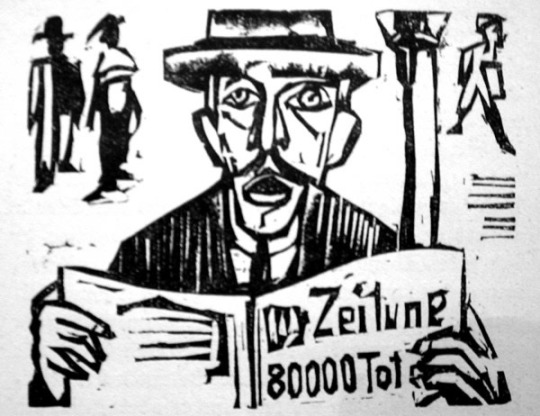
Simultaneous calls for universalism and individual freedom, the appeals of difference and homogeneity, the cogent argument of moral relativism against the call for a shared global narrative will, no doubt, continue to shake us in an era of unprecedented displacement and global climate change. Among other things, these challenges call for an art that, like the pervasive woodcut, infiltrates our purviews, and is attuned to the affect of contemporary life. It should carry with is a melancholic nostalgia, demand our empathy, blemish our idealized beauty.
If I limit myself to woodcuts, I'm reminded of the works of William Kentridge, Beatriz Milhazes, Leonard Baskin, Alison Saar, Irving Amen, Tony Bevan, Katsutoshi Yuasa, Assadour Bezdikian, Elizabeth Catlett, Lou Barlow, Leon Gilmour — I'm sure I'm missing countless others.
Retrospective Exhibitions on Käthe Kollwitz
Käthe Kollwitz, National Gallery of Art, Washington, D.C., 1992; Käthe Kollwitz: In Celebration of the 125th Anniversary of the Artist’s Birth, Galerie St. Etienne, New York City, 1992; Berner Kunstmuseum, Bern, Switzerland, 1946; Retrospective in honor of her 50th birthday at Paul Cassirer galleries, Berlin, 1917
Selected Bibliographies on Käthe Kollwitz
Knesebeck, Alexandra von dem. Käthe Kollwitz: Werkverzeichnis der Graphik. Band I & II. Bern: Kornfeld, 2002.
Prelinger, Elizabeth, ed. Käthe Kollwitz. Exh. cat. Washington, DC: National Gallery of Art, 1992.
Rix, Brenda D., and Jay A. Clarke. Käthe Kollwitz: The Art of Compassion. Exh. cat. Toronto: Art Gallery of Ontario, 2003.
Selected Bibliographies on Ernst Barlach
Laur, Elisabeth. Ernst Barlach: Sämtliche Werke, Werkverzeichnis I. Die Druckgraphik. Leipzig: E. A. Seemann, 2001.
Paret, Peter. An Artist Against the Third Reich: Ernst Barlach, 1933–38. Cambridge: Cambridge University Press, 2002.
Selected Bibliographies on Ernst Ludwig Kirnchner
Dube, Annemarie, and Wolf-Dieter Dube. Ernst Ludwig Kirchner: Das graphische Werk. 2 vols. Munich: Prestel, 1980.
Gercken, Günther, and Magdalena M. Moeller. Ernst Ludwig Kirchner: Farbige Druckgraphik. Exh. cat. Berlin: Brücke-Museum, 2008.
Krämer, Felix, ed. Ernst Ludwig Kirchner: Retrospective. Exh. cat. Frankfurt: Städel Museum, 2010.
Lloyd, Jill, and Magdalena M. Moeller, eds. Ernst Ludwig Kirchner, 1880–1938. Exh. cat. Washington, DC: National Gallery of Art, 2003.
Wye, Deborah. Kirchner and the Berlin Street. Exh. cat. New York: The Museum of Modern Art, 2008.
1 note
·
View note
Text
Death Visits The Dynamic
~Club Dynamic was Manhattan's hottest party spot. At least for this season. Being in the East Village Inclusion Zone – the most storm vulnerable IZ on the island – made it all the more enticing. The imagined proximity of Death was always erotic.
It opened at 8pm and closed at 8am, so things usually didn't get going until around Midnight. That is was New Year's Eve made that doubly so....and the countdown had just begun. The place thrummed and droned with Deep Vibe EDM and lots of beautiful bodies. Like most partying these days, it had a sharp edge of hysteria.
One hot brunette at the bar in a super tight black and red mini-dress seemed too calm for the place. Some had tried to chat her up, but she politely rebuffed them. The more insistent got a look from her real self that caused them to scurry away quickly. That glimpse of Death was a little too proximate.
Erika had not been in a psychic shithole like the Dynamic in a few decades. She'd grown out of this type of scene in her early twenties, but had kept coming back because it was a fertile hunting ground for slave boys, though less for recruiting Sisters. The females tended to be too drunk or drugged to properly assess.
Tonight, she was on a different kind of hunt. And she wasn't really wearing a mini-dress. She actually wore a Mark XXVI Combat Suit. Its outer layer was TeleCamo and was only projecting an image of her in that outfit. She did in fact own such a dress. She'd just been scanned wearing it and had that downloaded into the suit. Integrated into the suit on each forearm was an MRG-6, a Mini-Railgun, as Primary Armament.
Her body and skin had needed no editing however. Erika was a fully Enhanced Sister. Her bones and muscles had genetically increased density. Her blood teamed with nanobots that used her regular infusions of raw stem cells to repair and replace every single cell in her body on a moment by moment basis. And her brain, eyes and ears were embedded with millions of nanofibers – Neural Nanonics – all connected to her dozen personal on-board computers, keeping her aware of everything around her as needed.
Because of all that, while she was little more than a month shy of her seventieth birthday, she still looked to be in her late twenties and she had always been a beauty.
Though still a new political entity on the world scene, The Sisterhood had become immensely rich very quickly. Because of its foundational beliefs, it had the most advanced cybernetic and genetic Human Enhancement technologies in the world. All Sisters received whatever level of Enhancement they desired, which was the near maximum in most cases, and steady upgrades were the norm.
Even their infamous male Servitor classes were given various Enhancements and lived far better lives than the major of the world's non-wealthy population. This meant that the best and brightest women from all over the world sought to become Sisters. And no small number of pretty young men sought to become Servitors.
Everyone here at the Dynamic were Enhanced in one fashion or another. Only the wealthy lived in Inclusion Zones. The poor lived outside in The Shit, as Incluz called it. Too hot or too cold or too wet or too dry, Catastrophic Climate Change had showed up with a vengeance about twenty years ago, followed by all the expected horrors; war, pestilence and famine on a grand scale. Over three billion had died off.
The wealthy had built their protected enclaves and left the poor outside. The security personnel who guarded the enclaves lived in their outer rims, though they were well paid. Their children and those of the wealthy only mixed socially in the party scene. That helped provide the wealthy with 'new blood'.
Erika had noted those semi-desperate mating rituals while keeping an eye out for her real prey and monitoring the Hunting Trikona that also moved through this crowd. Her Neural Nanonics fed her visual, auditory and text information from all members of her team in real time. Like her, those three Sisters wore Mark XXVI's projecting 'party clothes'. If the revelers had known there was a Sisterhood kill team in their midst, there would have been a brutal panicked stampede toward the exits.
Normally, Mistress Erika, First High Priestess of The Cult of Mictecacihuatl, would not have been involved on the tactical level. She had done a lot of this kind of work 'back in the old days', but she was Upper Management now and too valuable to risk. But this was a Very Special Mission with Very Special Prey. Besides, she had to admit she did miss the thrill of The Hunt. Calm as she appeared, her blood was coursing hot tonight.
There was a second Hunting Trikona outside in an armored limo acting as the B Team, watching the comings and goings and monitoring the various Comm Nets. Plus they had heavy weapons 'just in case'.
Still, this was a dangerous mission. They were a long way from home and deep in unfriendly territory. While the Union of Matrilineal Republics, The Sisterhood's 'political manifestation', was in firm control of all North America west of the Rockies, this was New York City, capital of the 'rump' United States of America; the old Upper Midwest, North East and eastern Canada. Their political relationship was tense. The USA still claimed all of North America.
If things went in the soup, the Sisters would have a hard time getting out and there would probably be an international incident. But the USA did do a steady amount of business with The Sisterhood – and was notoriously corrupt and decadent – so something would be worked out.
No way they'd try anything like this in the Christian States of America, the Old American South. Those fuckers were batshit crazy and proclaimed The Sisterhood to all be Hell Spawn. There was regular bloodshed in the buffer zone between them. Any Sister caught in the CSA, for whatever reason, would be literally be burned in public.
Mistress Eva, Erika's sister and Spiritual Leader of The Sisterhood, had been unhappy about her going on this mission and had made her objections known in no uncertain terms. But she conceded because of the nature of the thing. Sisters had died because of the Greed of Men, therefore Pain and Punishment would be meted out.
The target tonight was named Christof. He had a dozen or more aliases, but was always known by his first name. And reliable intel said he'd spend New Year's Eve at The Dynamic. If he did show up, The Sisterhood would make sure he'd see less than a full day of the coming year.
Christof was a particularly vile breed of vermin; a trafficker of curve goale, literally 'blank whore' in Romanian. These were individuals, of both genders and all ages, who had been brain wiped and reprogrammed as sex slaves. Christof's organization had become the number one player of this game in Europe. They controlled their entire chain of 'product', from abducting victims outside of the Inclusion Zones of the major European cities, through the wiping and implanting, to operating the brothels where the goale 'worked'.
It was well known that Christof's sexual appetites included mutilating and murdering goale, especially young females who were 'rewired' to interpret pain as sexual stimulation. As Europe had become a quite depraved sinkhole, his operations had flourished.
The Sisterhood's General Security Directorate were well aware of this creature. The tech he used had been developed by The Sisterhood itself during The Dissolution Wars. They'd brain-wiped enemy male combatants, reprogrammed them and turned back against their various opponents. The fear of suffering such a fate had caused many of The Sisterhood's enemies to finally let them be.
But even though he was using their tech, Christof and his organization could not be a top priority. Everything worldwide was in flux and while The Sisterhood had become very powerful very quickly, its survival was not yet assured. So numerous horrors like him went unaddressed.
All that changed four months ago in a particularly awful outer zone of Munich.
Erika and Eva had been born and raised in Munich, and though they had lived in SoCal for a half century now, Eva still loved their hometown, even if it had mutated beyond the place of their childhood. Because of that she had requested of The Priestesses of The Cult of Sekhmet, The Sisterhood's primary Medical Cult, that they create a special Sub-Cult to attend to the poor and sick of Munich's outer zones, The Cult of Eir, a Norse Goddess of Healing and Medicine.
A Trikona of The Cult of Eir had been going about its regular rounds when it encountered one of Christof's abduction teams. Once upon a time the team would have backed off. But he and his people had become arrogant and a fight ensued.
Even though these were Healing Sisters, they were still Sisters and were trained and armed. But Christof's men numbered in the dozens and the running fight last nearly an hour. When it ended, two of the Sisters were dead and the last one badly wounded. Christof had lost at least twelve, with more wounded. The locals guarded the wounded Sister and threatened Christof's men, so they withdrew.
This truly had been an International Incident. The EU could not track down Christof. It was simply too corrupt. Its leaders were terrified that The Sisterhood would launch an overt strike against them because of that failure. The Sisterhood's political and spiritual leadership was in an uproar. Even Mistress Eva herself, The Sisterhood's Face of Welcoming Love, had been in a towering rage.. But to everyone's surprise, it was Mistress Erika, The Darkness, the Sharp Blade of The Sisterhood, its terrifying Priestess of Blood, who urged restraint.
Erika was well known for her fierce hatred of men. And her rage at them had never abated because men kept providing new reasons to be raged at. But where it had once burned like fire, her rage was now as cold as the depths of space.
“They expect a hammer. Let us use a scalpel instead,” she had said. Eva calmed as she saw the wisdom in that. The rest followed their lead.
And so nothing seemed to happen for months. Of course, the EU's intelligence apparatus willing opened all its doors to The Sisterhood, which is what Erika really wanted. Unlike her more tender hearted sister, she had little love lost for her old home town. She had landed in Southern California a half century ago and fallen in love with it almost immediately.
Erika took charge of the entire operation herself and bent a significant amount of Mictecacihuatl's assets and resources to tracking her enemy. Because she did have a perverse sense of humor, she titled it Operation Daisy.
And now, on the last day of the Patriarchal year, Daisy was about to bloom.
A few minutes before Midnight, Erika received an info packet from Bryn, the B Team leader outside in the limo. “Target Sighted,” is said, along with all the relevant data. The A Team inside received their own copies. It contained images of Christof and his security team, with a through analysis of their real time positions, bio-readouts, gear carried and projected movements. They were fairly well Enhanced and very heavily armed.
Everyone acknowledged and waited.
In the two hours they had been at The Dynamic, Sula, the B Team's cyberwarfare operative, had whispered through the Enhancements of the five hundred or so club goers looking for systems to jack into. By the time Christof and his crew arrived, she had ghosted over a hundred of them. Everything they saw, heard, felt, tasted and smelled was being monitored and passed on to Erika and the A Team inside.
The club's security system they bypassed and ignored....for now.
Christof had a twelve man security detail. Two proceeded the main group into the club, labeled A and B, and scanned the place. Six closely surrounded Christof himself, labeled Target One and E through J, while two more led, labeled C and D, and two others followed, labeled K and L.
Erika would stand by at the bar while the kill team did its work. They were veteran operators and knew exactly what they were doing. Minka, the team leader, was in the middle of the dance floor. Selene and Artemis were equidistant from her and each other on either side of the main entrance. They'd wait until Target One was in the center of their triangular kill zone until they opened fire.
At two minutes to Midnight, A and B passed through the Kill Zone. They would be Erika's first targets. Her Neural Nanonics had them highlighted in red, club security in yellow, the revelers in a dull green and her team in white.
All four Sisters heard a soft tone in their heads. Christof and his men were entering the Kill Zone. Each Sister pulled the hood of her combat suit over her head, which activated Reflective Mode. They are all now effectively invisible. In the mounting excitement, no one noticed.
Erika raised her arms, her targeting indicators showing a ninety seven percent accuracy ratio. The other Sisters were doing the same at the corners of the triangular Kill Zone. Their indicators showed a near one hundred percent ratio. And at these ranges, only heavy combat armor could stop the weapons being used.
The hard sharp snaps of hyper-sonic ferrodarts pouring from eight MRGs did breakthrough the din, though only a few people recognized the sound. All thirteen of the targets were down within little more than two seconds, shaking and writhing on the floor. The darts were neurotoxin delivery systems. It cause muscles to contract so violently bones broke and it caused neural inflammation that felt like molten metal poured into one's veins. The Sisterhood meant for Christof and his men to suffer before they died.
The sight of a cluster of large dangerous looking men suddenly falling to the ground and spasming violently did get people's attention and the rush for the exits began. Though faster and more orderly than Baselines would have done – these were all Enhanced humans – it was still a panic by any measure.
The Sister's suits shifted image. They now appeared to by NYPD officers in heavy tactical gear. The club goers worked hard to avoid them.
Erika strode over to Christof, placed her gloved hand upon his face. Microfine tendrils lanced into his flesh, seeking all his on-board cybernetics. They jacked-in and downloaded everything, his entire network configuration and all his data. That took thirty seven seconds. The A Team stood guard while this took place.
Jacking out, Erika looked up at the nearest CCTV cam, pulled her hood back to fully reveal her face and said clearly, “Greetings from The Sisterhood.” She then pulled her hood back and they headed for the back of the club toward the owner's private entrance.
At this point the bodies of Christof and his men began spurting blood from every orifice. That was captured on vid. Sula then totally crashed the club's security system. All that would be left was Erika's 'greeting' and the images of those deaths.
The Sister's exited into an alley behind the club just as a NYPD cruiser pulled up. It was driven by Alita, Erika's personal assistant. They all piled in. A block away from the club the vehicle's exterior shifted to a normal looking luxury sedan. In the meantime, Sula had borked and scrubbed every CCTV cam in a three block radius.
In front of the club, the B Team's limo was moving with the orderly chaos of people fleeing in self driving vehicles. They let the limo's AI do the driving, but Jo was ready to go manual and Bryn was jacked into the weapons suite, prepared to reduce any active opposition to flaming wreckage. But they glided out with the rest of the escaping clubbers without incident.
By the time the authorities had sorted everything out, they would all be well on their way back to SoCal on a diplomatic jump shuttle belonging to the Union of Matrilineal Republics.
Sula had received the data Erika accessed in real time and had uploaded it to a Sisterhood satellite directly overhead. The first operations against Christof's organization would be underway within an hour. And all would be completed within three days. Several hundred people would be violently terminated – The Sisterhood was making public examples here – and a few hundred more would become 'coerced assets' of the GSD.
That would leave over four thousand goale. Most of them were not retrievable and would be euthanized as painlessly as possible. The remainder would be transported back to SoCal for reprogramming.
~*~
The next morning there was a VidCon between New York and Los Angeles, capital of the UMR. The vid of Erika's 'greeting' and the gruesome deaths was played. Pixels undulated. Then a man and a woman faced each other.
The man was Frank Hammond, US Secretary of State. The woman, Renatta Sundersen, Minister of External Affairs, his opposite number in the Union of Matrilineal Republics' government.
They looked similar in their different ways, short professional haircuts and expensive business suits. Hammond was more 'masculine' of course. Sundersen's haircut was more 'feminine' and her suit was clearly of The Sisterhood's style, with the Star, V and Wreath pin on her lapel.
She had known Hammond for over four decades from when she herself was a US Foreign Service Officer. That made their conversation familiarly confrontational.
Hammond looked tired and angry. “That is clear evidence of a violation of U.S. Sovereignty and the commission of what is effectively a terrorist act by a high ranking member of The Sisterhood's leadership,” he said. “What in God's name was she thinking, Renatta?”
“More like Goddess' Name, Frank, and you know which one.”
Hammond flinched slightly at that remark. Sundersen knew she had the advantage over him. She was sure he'd been up celebrating until last last night, while she was well rested, the Sisterhood's New Year's celebration, The Festival of The Turning, being five days in the past.
“I Swear by The Goddess' Many Names that I did not know anything about this until a few hours ago.” She was telling the truth about being out of the loop on this and Hammond knew that by her Oath.
“So then how do paint ourselves out of this corner? The president doesn't want a war, cold or hot,” he said. “But half the Congress is on the warpath, mostly The Federalists, but some of our party, as well.”
His party were The Liberals, who were far more realistic about reclaiming the U.S. Former territory. The Federalists were the 'war party' and hated The Sisterhood. But all sides feared and loathed the CSA, which kept all this in check. For now.
“I received a full briefing on this about an hour ago and the GSD gave me some information your president should find useful. We will sit on it, so how you use it will be at your discretion.”
Hammond looked skeptical. “I'm listening."
Sundersen tapped a hologram on the virtual console that illumined her desktop.
“I just sent you a file with the information,” she said.
Hammond paused while checking receipt, then opened the file. Because of his long friendship with Sundersen he didn't engage any of his Neural software to 'pokerface' his expression. He read, his mouth and eyebrows slightly twitching. Then he smiled broadly.
The data revealed that the leading Federalist Senator plus seven Federalist Congressmen – and they were all men – had been clients of Christof's organization and that Federalists in New York's municipal government had been on his pay roll.
“Yes,” he said with satisfaction. “This will do very nicely.”
Sundersen smiled back at him. “I thought you'd like it.”
He turned serious again. “Renatta, I know it is a tall order, but could you please ask Her Grace to be a bit more discreet in these matters in the future?”
Sundersen gave him a rueful smile. “Mistress Erika is a force of nature, Frank. But I will convey your request.”
~*~
Erika was still too keyed up to sleep. She'd dozed a while on the shuttle from New York, but that jump lasted barely an hour. At the moment she reclined on a chaise lounge in the ocean view parlor in her rooms in the Cult's Headquarters. She wore a short fine silk robe of a pale floral design Eva had given her.
A male Body Servant massaged her feet. At the other end Seemkoo, her favorite Pleasure Server, a tall slim pretty mulatto, sat on the floor. He passed her a pipe full of hashish, a local Sisterhood blend. She planned to have him ride her hard in a short while, then have a deep well fucked sleep.
Being early winter, the Plexiglas doors were closed, only letting in the still warm Southern California sun. The Mictecacihuatl Cult's Headquarters, a solid mass of tempered steel and smart concrete, sat upon the western end of the Santa Monica Mountains, just north of what was left of Malibu. Two decades of typhoons had washed away most of that old neighborhood. The sliding steel doors just past the Plexiglas ones where a reminder of that reality.
The door chimed, then opened. Renatta Sundersen had been expected. She entered and dropped into a well stuffed chair opposite Erika.
“Your Excellency,” Erika said with a nod.
“Your Grace,” Sundersen replied, returning the nod.
“So, Renatta, how did it go?”
Renatta smiled. “He was quite pleased with what we provided him.” She placed a mini-drive on the side table next to the chair. “The whole thing.”
Erika smiled wolfishly. “I thought as much.” She frowned. “Goddess, where are my manners? Would you like a drink?”
“Yes,” said Renatta. “Some bourbon please.”
“Seemkoo?” said Erika. He moved gracefully to a cabinet, then looked quizzically at Sundersen, who had watched him appreciatively.
“Two fingers, neat,” she said.
She and Erika sat quietly for a moment while she took a few sips of of her drink, then sighed contentedly.
“Are you planning to share this with Saxon Park?” Sundersen said.
Saxon Park was the HQ of the U.S. Unified Intelligence Agency located in central Westchester County north of New York City. Along with the irradiated ruins of Washington, the abandoned CIA and NSA HQ's now lay in the Disputed Territories between the USA and the CSA.
Erika sighed a bit. “I thought it best to leave that to President DeKay. It might ding the relationship with the GSD a bit, but they'll have to understand the security protocols in this situation. The Federalists have their own people in the agency after all.”
Erika gave Sundersen a thoughtful look. “Forgive me for dropping that bomb in your lap,” she said.
Sundersen smiled, nodded, “No forgiveness necessary, your Grace. That nasty little fucker required a public execution. Besides, that's what y'all pay me for.”
Erika flinched as the Body Servant worked a painful spot. He did not pause at all. Everyone knew she had a high pain tolerance.
Sundersen finished her drink, stood. “I expect you're rather done in by all of this, so I'll leave you be.”
“Thank you for coming by, your Excellency,” said Erika.
Sundersen made a slight bow. “It was my pleasure, your Grace.” She then exited.
Erika sighed deeply, motioned the Body Servant to stop. “Thank you,” she said.
He bowed deeply. “I live to Serve, Mistress.” Then he exited.
“Seemkoo,” she said languidly, pulling her robe open and spreading her legs. “Come here and prepare me.”
He smiled softly, his shorts bulging. “I live to Serve, Mistress,” he said, then brought his tongue and fingers down between her thighs. Erika gasped lightly, arched her back. All would soon be right in her world.
5 notes
·
View notes
Text
Days 165-167: More Munich (Food, Beer, & Art)
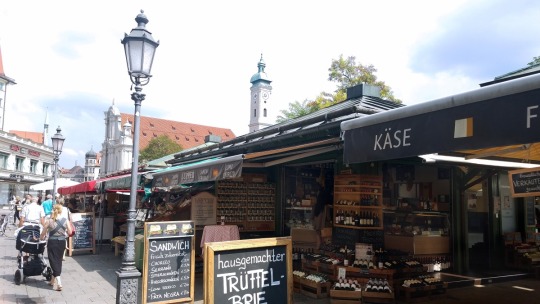
After two long and draining day trips out of Munich--and a short but even more daunting trip to Dachau on the horizon--we decided to sleep in and take things slow. Apart from the aforementioned Dachau trip, we'd be spending our last three days in Munich experiencing its sunnier side of food, beer, and art.
For the first day, we had booked a guided tour of the Viktualienmarkt, the city's world-famous outdoor food market that we'd visited on our introductory walking tour. We’ve seen plenty of old food markets in the towns and cities we’ve visited, but they tend to be a little intimidating to enter as a tourist--especially if you're like me and don't know much about cooking to begin with.
Now, we would get shown around the food market by a knowledgeable local and experience a curated tasting of some traditional Bavarian fare.
We met our guide at the New Town Hall in Marienplatz, and he turned out to be a friendly college student doing tours as a side gig. We learned that we were actually the only two people booked for the tour. We held out hope that someone might join us at the last minute, but nope--we'd be getting a private tour.
Some people might have loved that right off the bat, but we weren't those people. Remember how glad we were to have just missed the same fate on our trip to Connemara back in Ireland? We were a little nervous that it would be awkward with just the three of us, but our guide seemed a little awkward about it too, so we all just gave ourselves a break and rolled with it.
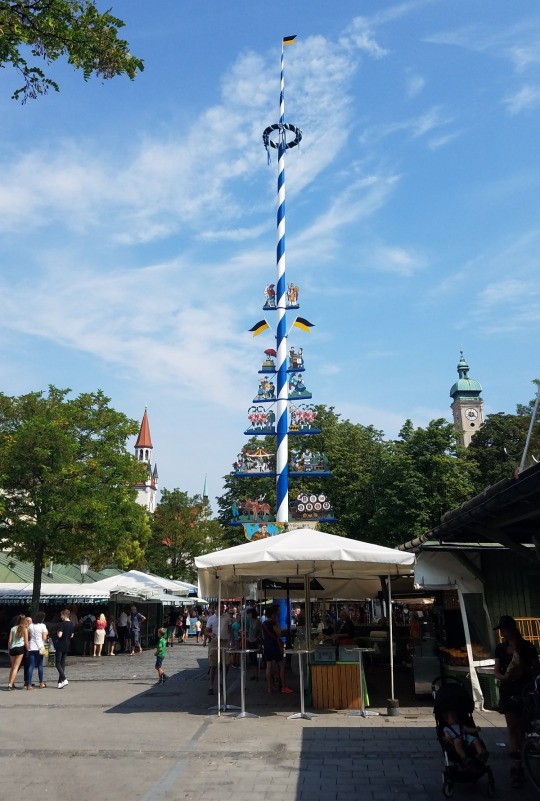
Our first stop was for a traditional Bavarian breakfast of white sausages (weisswurst). They're thick, pallid, rubbery, and frankly a little intimidating. But they're also absolutely delicious. The key is that you have to slice through the casings and peel them off the sausage before you eat them. This does nothing to improve the visual aspect, but such petty concerns evaporate with the first bite.
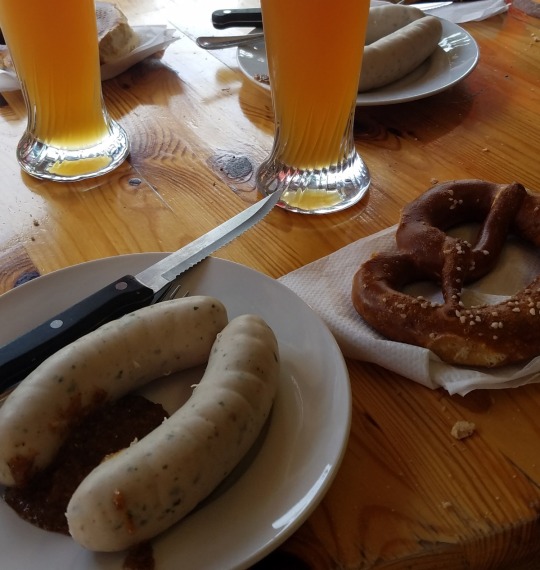
Weisswurst aren't smoked or seasoned, which gives them a delightfully fresh and delicate flavor. That's also why they're considered a breakfast food--before refrigeration was invented, they had to be eaten right after they were made.
Keeping with Bavarian tradition, we ate the sausages with sweet mustard, fresh pretzels, and a tall glass of weissbier. (I've never been a big fan of mustard, but this sweet mustard was a revelation.) It was a rich, heavy meal, and our guide told us that this is mainly eaten on special occasions--like Sunday brunch or an early get-together with friends.
Thankfully, the rest of our stops weren't nearly as filling.
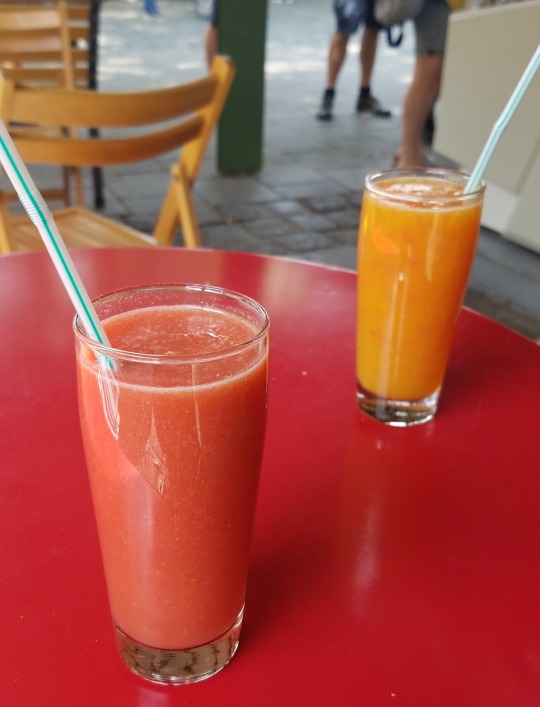
Our next stop was for some fresh-squeezed juice. They had a fairly normal range of tropical fruit juices like mango, grapefruit, and peach, but they also had some more intimidating options like avocado juice.
Next, our guide took us into a stall run by a local biodynamic farm, where we chatted with the proprietor and sampled some of their wares. A lot of the biodynamic stuff is based on astrology and other weird mysticism, but there was some interesting things as well. They grow their crops from "ancient seeds," which are strains of fruits and vegetables that haven't been breed into bland homogeneity. Their produce came in all sorts of weird shapes and colors that would immediately qualify them for rejection at a typical supermarket. But I wouldn't be surprised if the proprietor was right in her assertion that they are more flavorful and possibly even more nutritious.
According to the proprietor, "stronger foods make stronger people."
The stall also sold a variety of preserves, sauces, and even ointments. To be honest, it felt a little like being back at an argan oil "pharmacy" in Morocco. But I was still suffering from bug bites I'd gotten in Prague, plus the wasp sting in Nuremberg the day before, so I bought an ointment advertised for bites and skin irritation. I don't know if it actually helped, but it smelled nice.
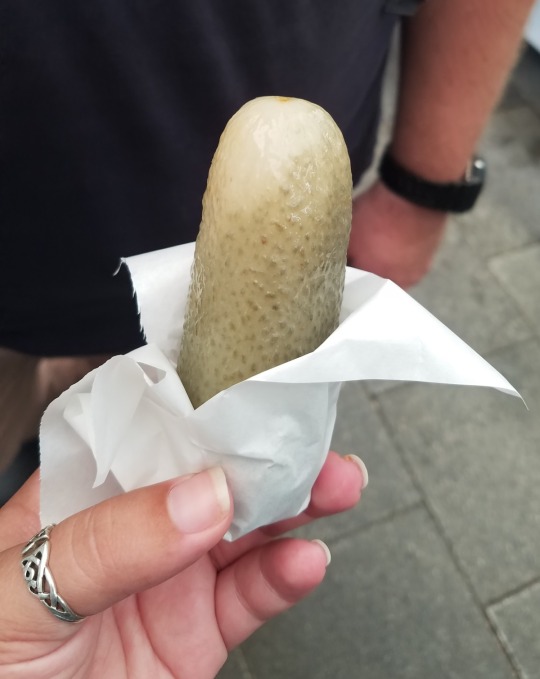
Next was a stand selling an intimidating variety of olives and pickles. Jessica and I both decided to try a "pepper pickle," which was surprisingly spicy but extraordinarily juicy and flavorful--genuinely one of our most memorable food experiences of the entire trip.
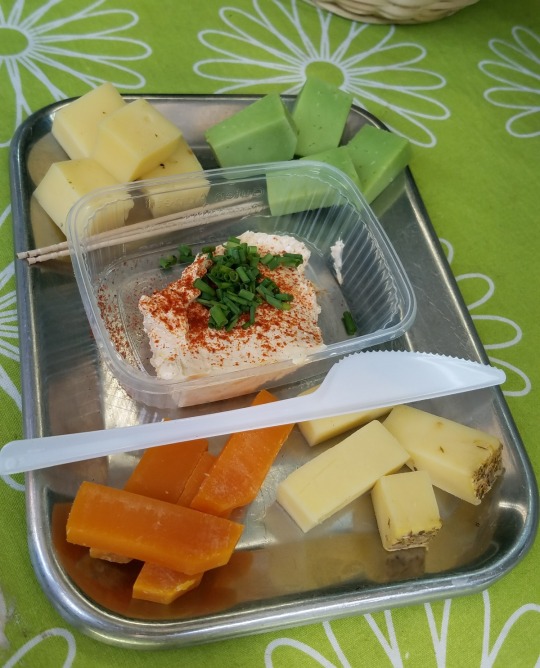
Our penultimate stop in the Viktualienmarkt was a dairy goods stall, where we sampled a cheese platter. The first three cheeses were local: one fresh cheese, one aged cheese, and one floral cheese with various herbs and flowers mixed in. The young cheese tasted a bit like gouda, the aged cheese tasted more like a chewy, crumbly cheddar, and the floral cheese had an earthy, nutty flavor.
The fourth cheese was a Dutch wasabi cheese, which I didn't hate quite as much as I'd expected to. The fattiness of the cheese cut most of the wasabi's spiciness, but I just don't like the flavor of wasabi.
The last sample was a Bavarian cheese spread called obatzda. Along with the weisswurst and pepper pickle, the obatzda was one of the stand-out discoveries of the tour. Everyone has their own signature recipe, but it generally involves mixing soft cheeses like camembert with paprika and other spices, plus a softener like butter, cream cheese, or even beer. Like many traditional foods (such as Lebkuchen), it was invented out of necessity for finding a way to turn scraps into something tasty and nutrient-dense.
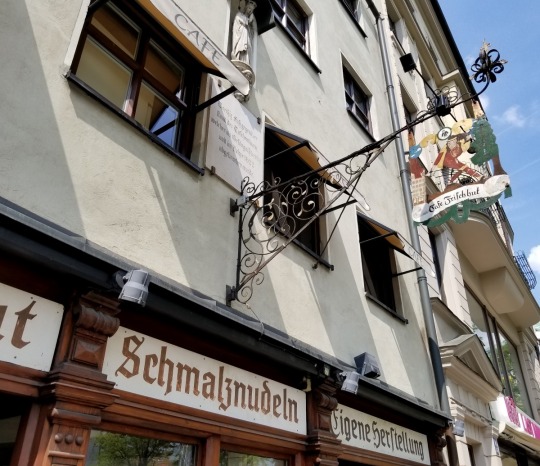
As we left the Viktualienmarkt, we made our final stop for desert at a local bakery just across the street from the market. There, we got to try a local delicacy called a schmaltznudel--a big flat sugar doughnut with a thin layer of crunchy dough stretching across the middle. Predictably, it was delicious.
All throughout the tour, we couldn't help but noticed the swarms of bees everywhere. In the pastry shops, they were literally piling up in the display cases.
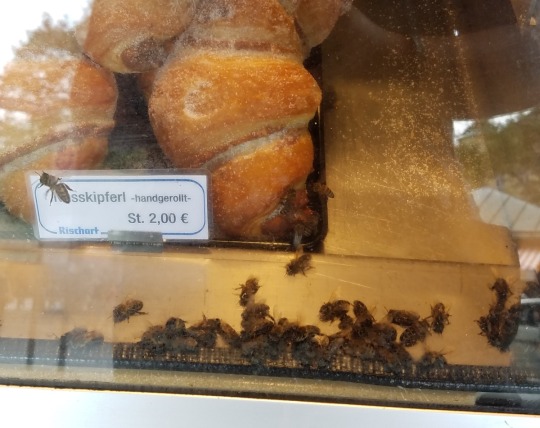
When we asked about them, we learned that bees and wasps are protected in Germany, and it's illegal to kill them. Thanks to the unusually wet spring and hot summer Europe had experienced this year, the bee population had exploded along with the flowers. And there was nothing anyone could do about them except ignore them and hope to not get stung. With the welt of yesterday's wasp sting still throbbing, I was not especially enthused to learn all this.
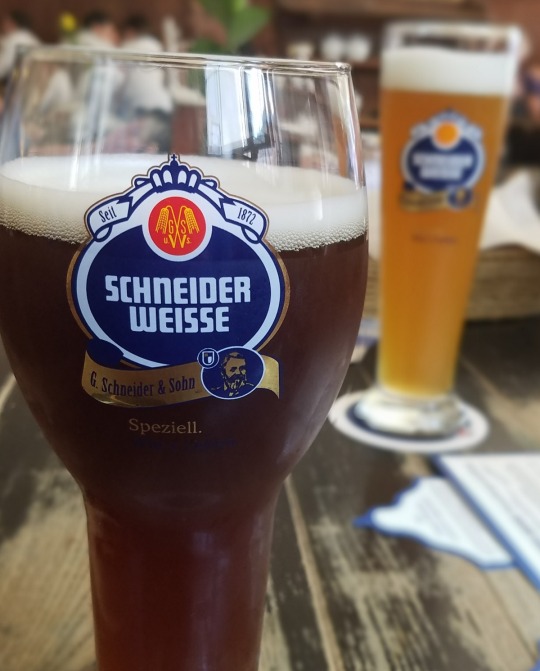
Since we were already nearby, we decided to stop for a drink at the Schneider Weisshaus. As we'd learned on our first-day walking tour, Schneider Weisse has over half a dozen different types of wheat beer on tap. Most Bavarian beerhouses only have three beers on tap at most: a pale lager, a dark lager, and a pale wheat beer. Schneider has pale wheat beers, dark wheat beers, filtered and unfiltered wheat beers, and even a 12% ABV wheat beer. We only had one each, but they were both very good.
Wheat beers were the first beers that Jessica realized she actually liked, but I had never been a fan. I could stand a few sips of Blue Moon with orange juice, but mostly they tasted gritty or dirty to me. But all the Bavarian weissbiers we tasted were really good. They can still get a little gritty as they warm up, but they're super smooth when chilled and have an amazing banana-like flavor. It's funny to imagine the first Bavarian to taste a banana and discover that it tasted like beer.
In reality, as we'd learn later, very few historical Bavarians actually got to enjoy weissbier. The traditional Bavarian beer purity laws (Reinheitsgebot) banned the production of beer from anything other than malted barley. Wheat beers could only be made by special permission of the government, and they were extremely exclusive. While researching Schneider back home, I learned that it was the Schneider family that pushed for broad legalization of wheat beer production in the 1800s. And were it not for a relentless, century-long push to popularize this amazing brew, Bavarian weissbiers may have gone extinct out of sheer obscurity.
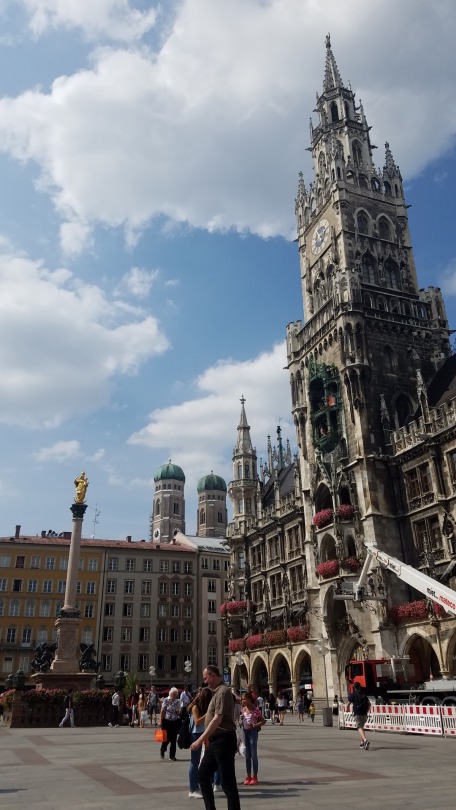
It was threatening to rain, and we were still quite tired from our last few days, so after a little bit of souvenir shopping we headed home for a nap and an early evening.
I finally bought that Bavarian flag mug I'd been eyeing earlier, and we drank the fume blanc we bought in Schwangau.
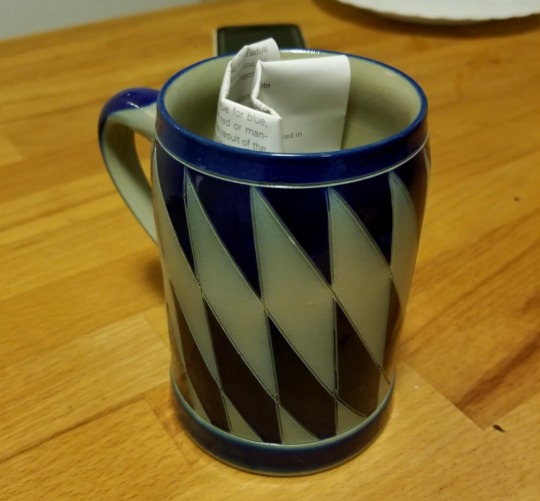

Our next day started with a trip to the Dachau concentration camp. But like Auschwitz, I will save that for its own post.
After recuperating from that ordeal, we headed out for our much-needed evening entertainment–a tour of traditional Bavarian beer.
The tour started with a bottle right in the Radius Tours office at the train station–a 33cl bottle of Hacker-Pschorr helles pale lager.
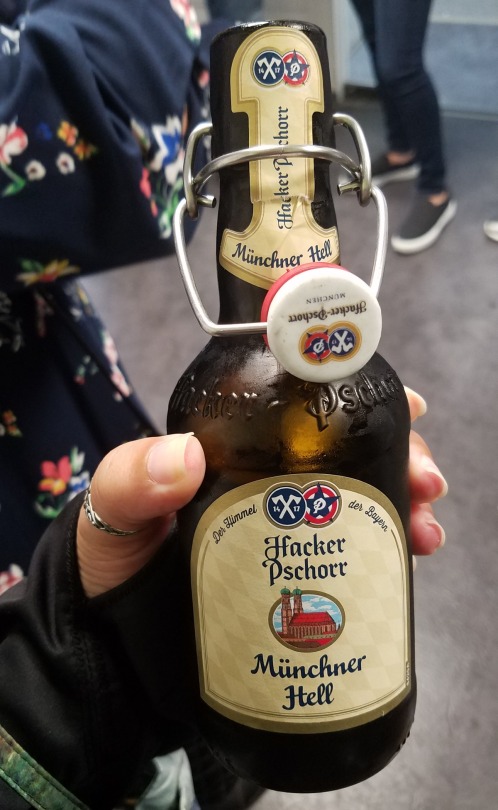
As we drank, our guide asked the group if we could name all six Munich breweries. After nearly a week in the city, Jessica and I were able to immediately rattle off four: Hacker-Pschorr (that one was easy), Paulaner, Augustiner, and Hofbrau. The rest of the group was eventually able to get the last two: Spaten and Lowenbrau.
To be a Munich beer, it has to be produced, cellared, and bottled entirely within the city limits of Munich, and some aren’t available anywhere else. Augustiner–the one locals generally consider to be the best–doesn’t spend a dime one exporting advertising. And because they’re technically a church organization, they don’t have to pay tax and give almost half their income away to charitable causes within the city. So Muncheners can drink all they want with an easy conscience.
One member of our tour group seemed perplexed by the notion of the beers being made entirely in Munich. To our guide's mild but steadily increasing perplexity, the man kept asking, "but where is the beer actually made?" I guess it says something about globalization that our ideas of where a company is located and where its product gets made have become so totally separated.
Beers finished and bottles stowed away for recycling, it was time to set out. Our guide--a friendly if slightly haggard Brit--lead us down to the underground metro platform, where we caught a ride over to the other side of the Old Town. There, we'd be enjoying a visit to the Beer and Oktoberfest Museum.
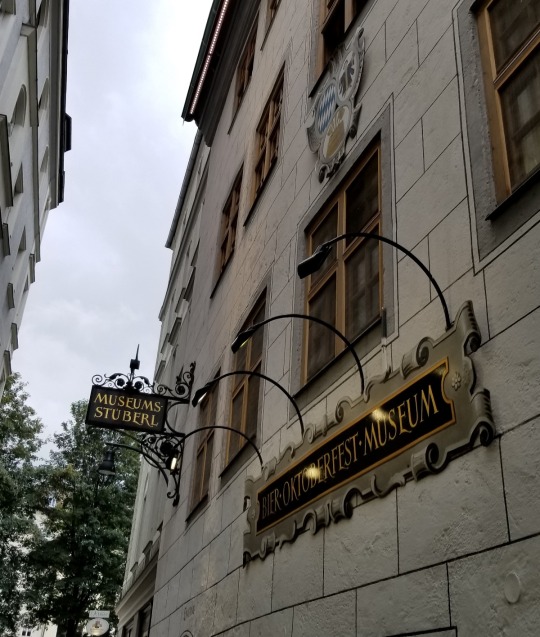
Though nominally a museum, the place is also a first-rate beerhouse and restaurant. The mayor himself frequents the establishment, or so we heard, and regulars keep their personal steins in rented lockers near the bar.
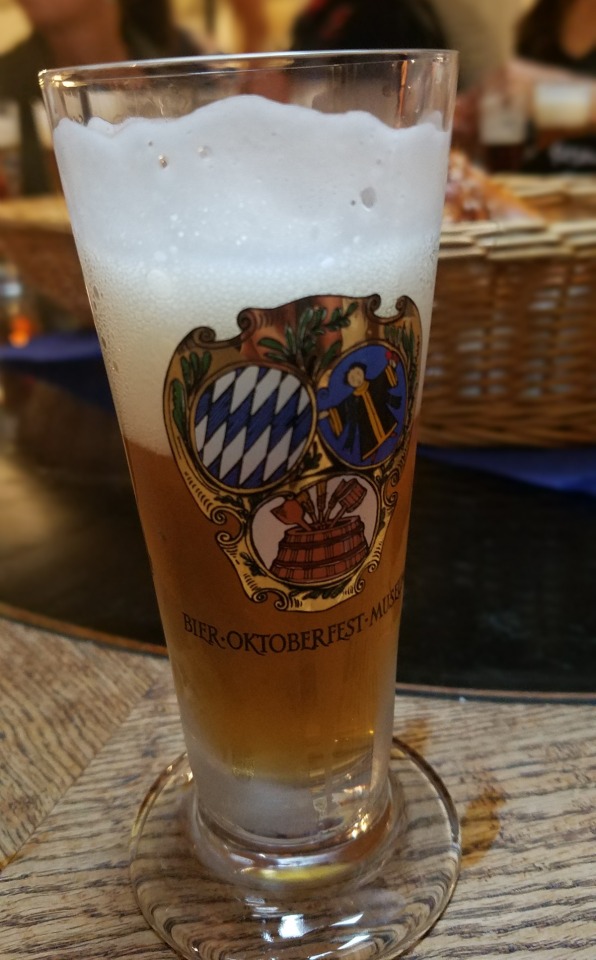
In a tasting room, we got to try samples of the three main types of Bavarian beer: light helles lager, dark dunkel lager, and weissbier. We learned some of Bavaria's beer history, some of which we've already shared--such as the origin of beer gardens.
Our guide told us about the medieval Bavarian beer purity laws of Reinheitsgebot. Of course, we'd long been vaguely aware of them through our uncle Doug, a master brewer trained in strict Bavarian tradition. Jessica and I had never been especially interested in beer before the trip, but finally, after nearly 10 years of legal drinking, we had seen the light. Better late than never.
Under the Bavarian purity laws, only barley, hops, yeast, and water could be used to make beer. No fruit or other additives were allowed. The reason wheat beers could only be produced by special permission of the government was to reduce competition with bakers. Wheat and barley could both make good beer, but barley bread wasn't nearly as desirable as wheat bread.
Our guide also talked about beer's role in Bavarian culture, which can be neatly summarized in the popular catchphrase "Beer is food." Beer is full of energy for fueling farmhands and factory workers, and for most of its history beer was much safer to drink than water. Pretty much every successful civilization before the advent of effective water purification was fueled by some form of alcohol or tea.
When safe drinking water finally did become common, governments in Europe and America suddenly started treating beer like a luxury adult good. In other words, they could start taxing and regulating the heck out of it. But Bavaria proudly resists this tradition. If you want to drink a beer in Munich but don't know if it's allowed, simply ask yourself if you would feel comfortable eating a sandwich. Anywhere you can eat a sandwich, you can drink a beer.
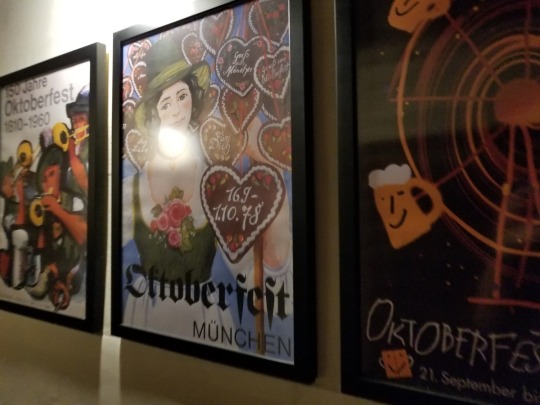
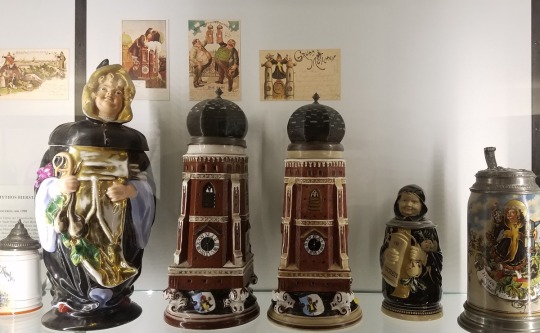
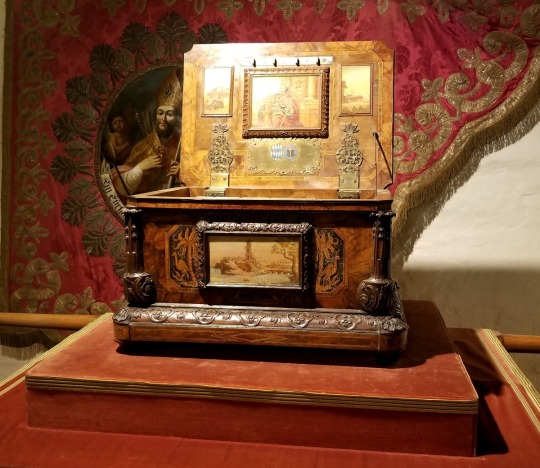
Upstairs, we got to see pictures and artifacts covering the history of Oktoberfests past and present. Thanks to our first-day walking tour, we got to impress our guide with our guide with our knowledge of the celebration's origin as a wedding/anniversary celebration.
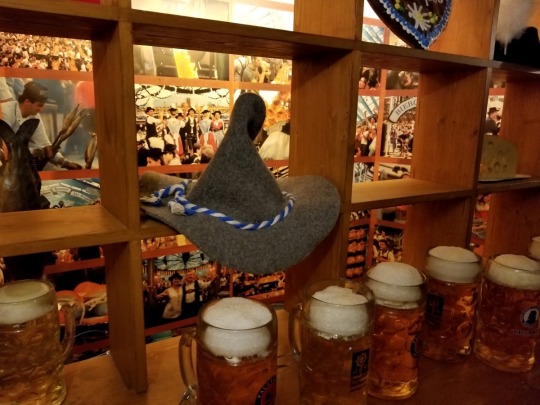
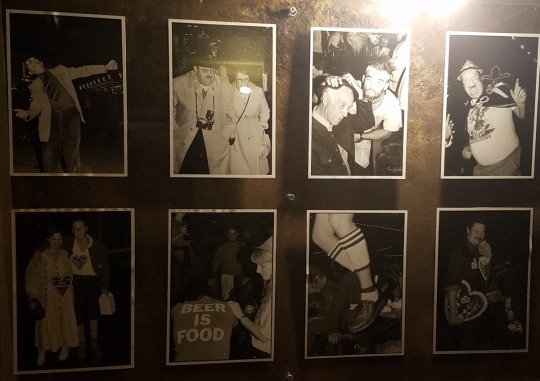
We also learned that the popular British and American image of Oktoberfest, at best, only a small part of the picture. I've always pictured it as a gaudy celebration of raucously inebriated tourists drinking gallons of beer served by oversexualized beer maidens, with real Bavarians staying as far away as possible. That may describe the Hofbrau tent, but there are still five other Munich breweries that each have their own tents as well. And those tents are filled almost entirely with locals.
In the rooms dedicated to beer in general, we learned more how Bavaria became such a mecca for beer. The purity laws were a big part of the equation, but another part was a combination of geography, technology, and politics.
When Europeans discovered the American continents, they brought back all sorts of treasures, from precious gold and silver to the even more precious potato. And--without even realizing it--they also brought back a new species of yeast. This new yeast could be used to make a cleaner, more quaffable beer than anyone in Europe had ever tasted before. But it only worked in cold, strictly controlled environments, and most of Europe lacked either the climate or the skills to take advantage.
For Bavaria, however, with its cool alpine climate and exceptionally well-regulated beer industry, it was practically a gift from God. For a good three hundred years or so until the invention of industrial refrigeration, lagers were the uncontested domain of Bavaria and its neighbor Bohemia.
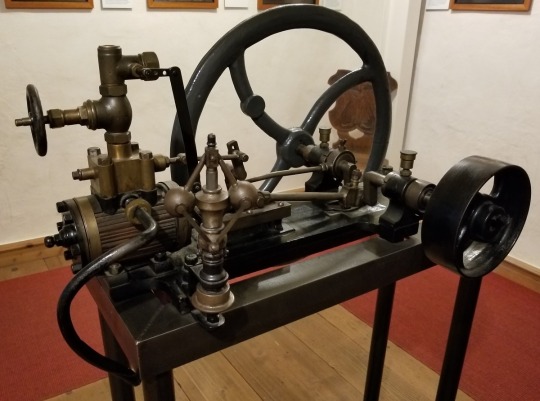
In fact, at least according to the museum and our guide, it was France's envy of German beer that spurred their chemists to finally invent refrigeration. At the very least, French breweries were among the first and most enthusiastic adopters of the technology. By the 20th century, Bavarian-style pale lagers--or at least mediocre approximations thereof--were being mass-produced around the world.
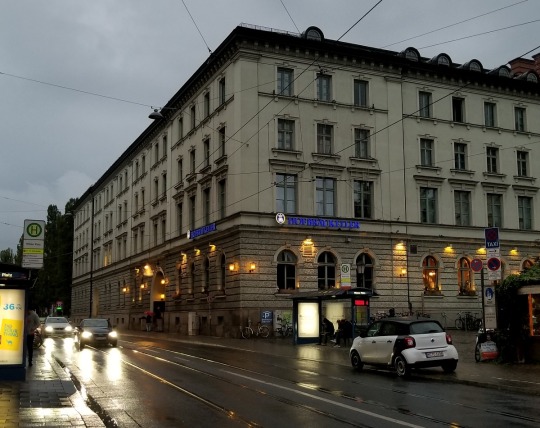
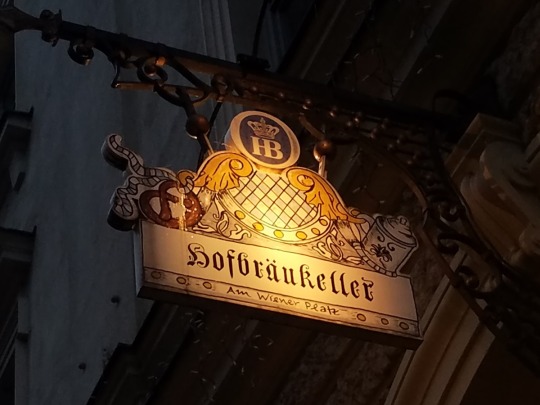
The night culminated with a dinner at the Hofbrau Keller on the eastern end of the city. Unlike the infamously rowdy Hofbrauhaus, the Keller is a more relaxed, family friendly establishment. In general, we learned, a beer "house" is big and boisterous while a beer "cellar" is smaller and (relatively) peaceful, with a beer garden outside.
Our guide had prepared us for placing our beer orders. We could have either a half-liter or the full mass--a one-liter pitcher of beer that constitutes a Bavarian's idea of a single serving. Not wanting to miss out on the full cultural experience, Jessica and I both opted for the mass. Our guide seemed impressed--only one other person in the entire group did the same.

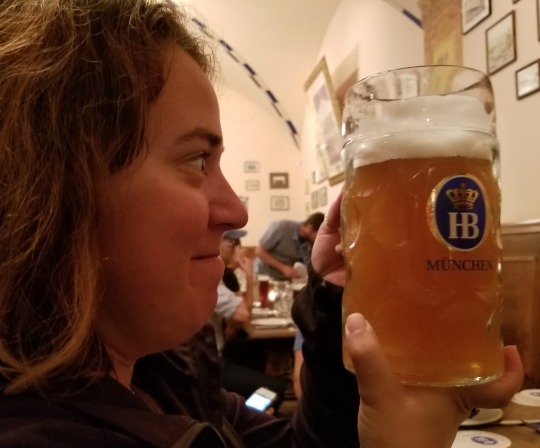
One liter of beer is no joke. After thirty minutes, we had barely dented them. But somehow, it seems to get easier the deeper into our glasses we got.
For dinner, we enjoyed a mountainous "vesper" board loaded with local meats, breads, and cheeses. And accompanying the board was a steaming pot of weisswurst. Internally beaming at our good fortune to have been shown the ways of weisswurst on our Viktualienmarkt tour, Jessica and I got to be the experts of our table, enthusiastically digging in while the others were still perplexed by its variously off-putting physical attributes.
Despite our guide's perfectly sufficient explanation about how to skin a weisswurst--as well as the exemplary performance of Jessica and myself--one of our tablemates didn't deem to have gotten the memo. The woman, who may have been the wife of the man so confused by the concept of urban breweries, began to fork-scrape the fillings of her sausage into a shredded horror on her plate. Visibly dismayed at the atrocity, our guide quickly stopped her, showed her again how to correctly peel her weisswurst, and didn't leave until she vowed never to do it the other way ever again.
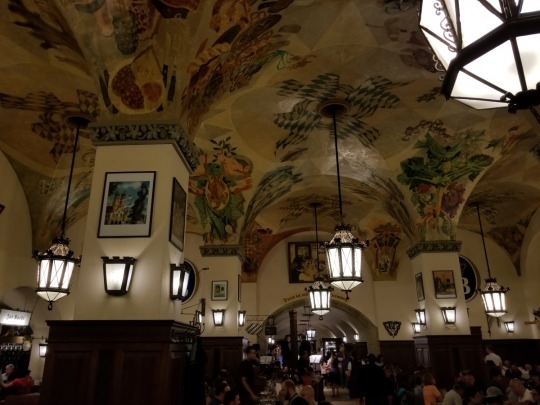
Catching a tram back towards Marienplatz, our tour concluded outside the doors of the Hofbrauhaus. We could hear the sounds of oompah music and three-thousand drinking tourists. We peeked inside just long enough to take a couple pictures and make badly needed use of the facilities. It wasn't something we'd normally do--using the facilities uninvited without being a customer--but with the amount of business the place was doing, I don’t think it was much of an imposition.
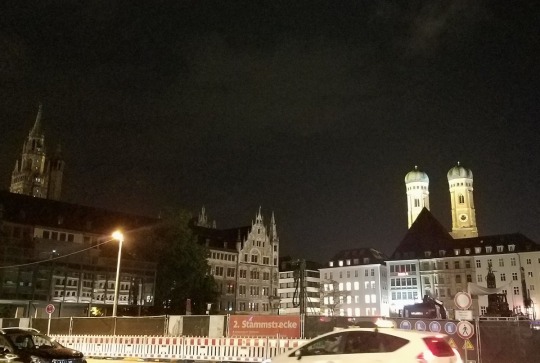
After stumbling our way back home in the blissfully cool night air, we of course capped the night off with a taste of Jessica's Little Bay.
On our last full day in Munich, we found ourselves with plenty of things we could do and little energy to do any of it. There was the Residenz, the Nymphenburg Palace, a Nazi Documentation Center, and a host of museums--including the BMW world headquarters. And that's ignoring all of the other things there are to see in the surrounding Bavarian countryside. I could happily spend another week or two back in Nuremberg alone.
We already knew that we both wanted to visit the city again someday, so we decided to take it easy and do just one more thing--the Alte Pinakothek, the city's main art gallery of old European masters.
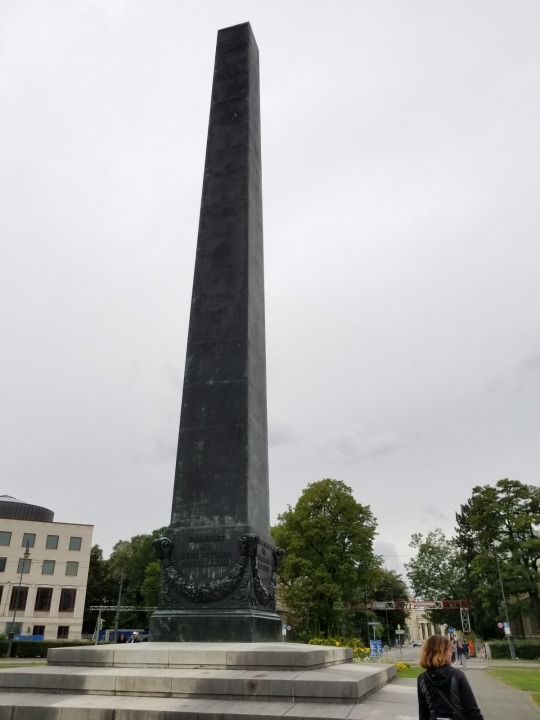
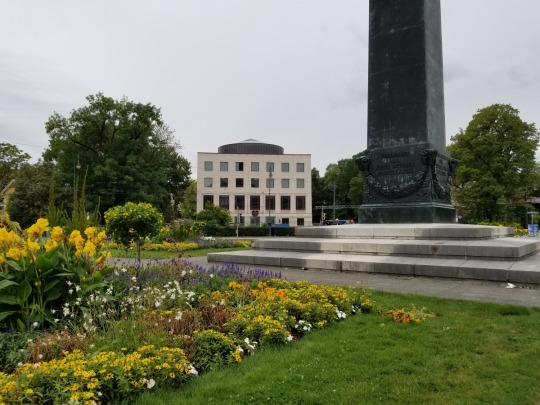
It was a nice day, so we decided to walk over to the museum quarter after catching a tram to the station. Along the way, we passed through the Karolinenplatz, which is really more of a roundabout than a square. It is dominated by a stark black obelisk. With our translation apps and a bit of Googling, we learned that it was erected in honor of the thirty thousand Bavarian soldiers that died in Napoleon's disastrous invasion of Russia in 1812. Apparently, the metal used to build the obelisk came from melted-down Turkish weapons captured during Greece's war of independence from the Ottoman Empire.
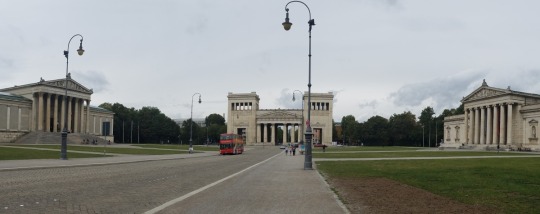
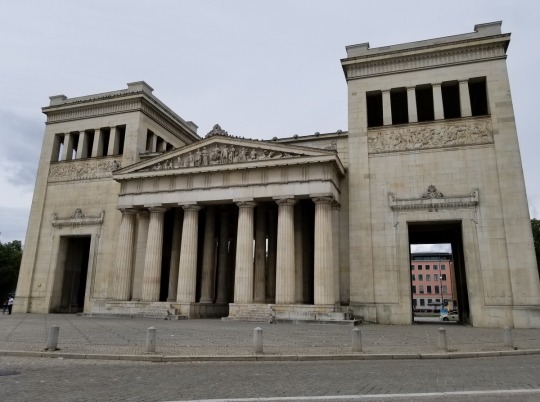
Past the square, I led us on a short detour to see the Königsplatz, a square surrounded by classical monuments and museums. Outside the museum of ancient sculpture, we were pleasantly enthused yet somehow not surprised to find our old friend Laocoön, this time sporting some serious ink.
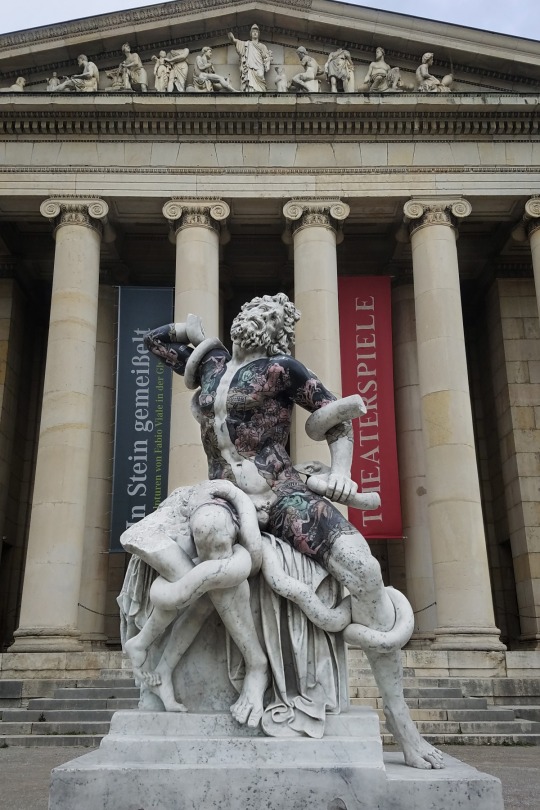
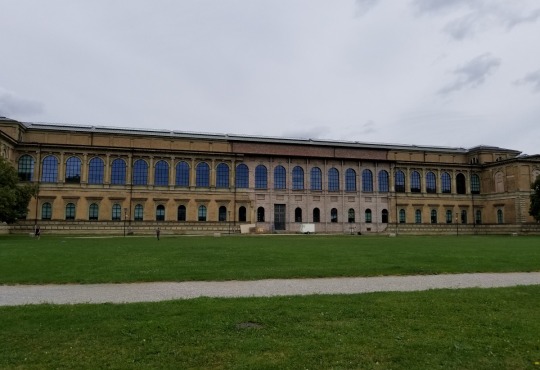
Finally, we made it to the Alte Pinakothek. It may not be a match for the Prado or the Louvre, but it is still a fantastic collection--especially for anyone into Renaissance and Baroque art.
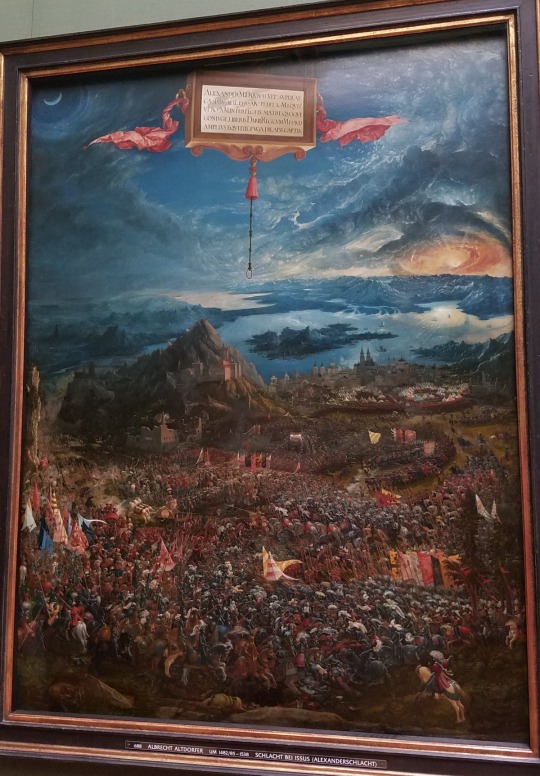
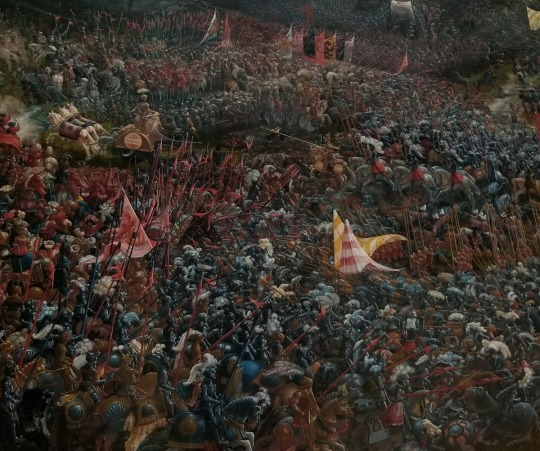
One of the museum's signature pieces is a 16th-century painting by Albrecht Altdorfer of a battle between the armies of Alexander the Great and Darius III of Persia in 333 BC. We'd probably seen hundreds of battle paintings by this point, but this one was utterly unlike any other. Epic in scope and perspective, it zooms from individual soldiers in the foreground to a curved Earthscape of the entire eastern Mediterranean Sea in the background. Overhead, the sun and moon seem locked in a showdown between light and darkness amidst a rippling, cloud-filled sky.
It actually had a lot more in common with paintings we'd seen of the apocalypse than of other historical battles. And that was very much intentional. Tensions between the West and the Middle East were perilously high, and many believed that the end times were close at hand. Some things never really change.

We also saw some works by Albrecht Dürer, including the famous self-portrait where he depicted himself as a Christ figure. But Jessica and I were more interested in a somewhat subtler but no less provocative pair of paintings.

In this two-panel painting of The Four Apostles, Dürer shows John, Peter, Mark, and Paul huddled together in an open circle. The painting is immediately unusual for its unidealized depiction of the four men as ordinary figures--aged, wrinkled, and not especially attractive. But more than that, and true to Dürer's Franconian roots, the painting is actually a powerful piece of Protestant propaganda.
John holds the Bible open as Peter--the saint so deeply associated with admission into heaven--reads it closely. Meanwhile, Mark and Paul--his sword at the ready--look challengingly outward. The anti-Catholic sentiment is clear: read the Bible for yourself if you want salvation, and stand guarded against anyone who would try to stop you.
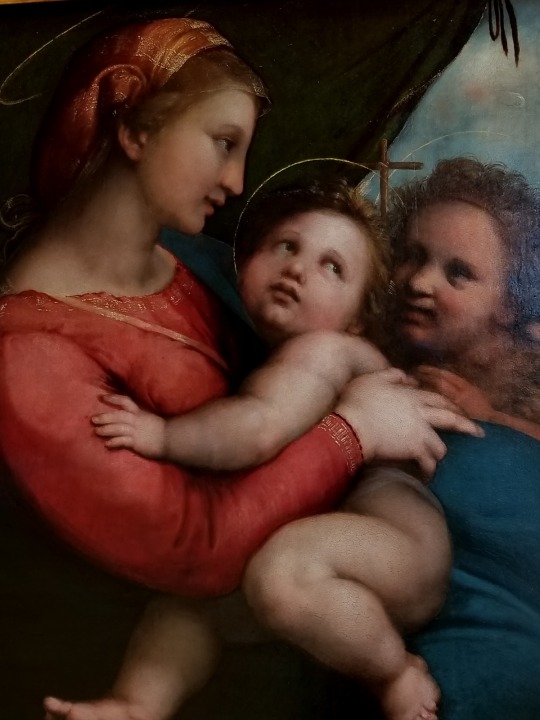
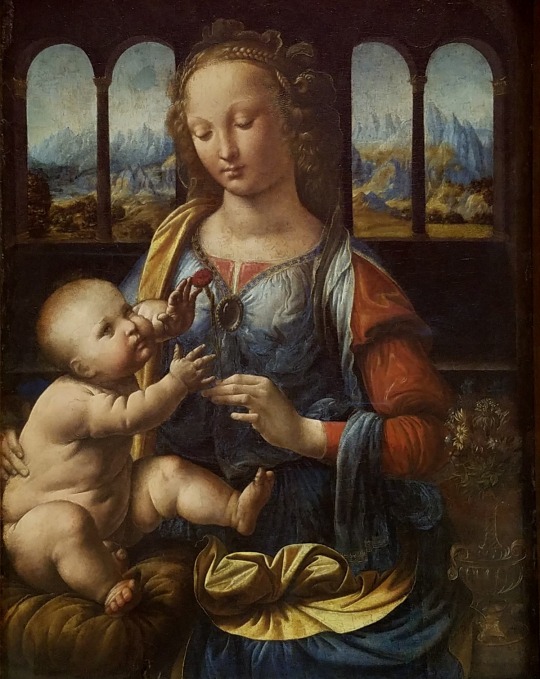
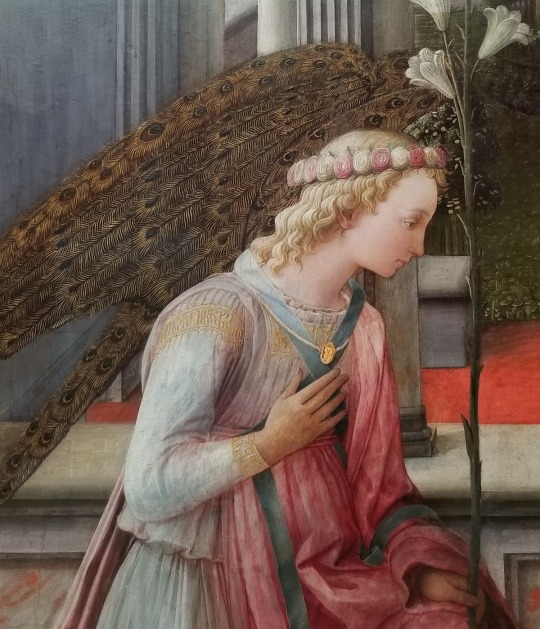
There were plenty of Italian Renaissance paintings as well, including masterpieces by Da Vinci, Raphael, and Lippi.
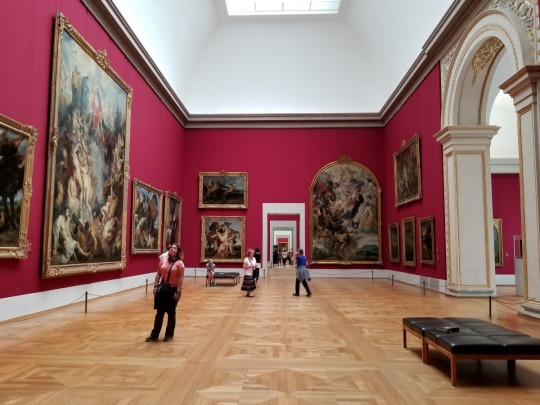
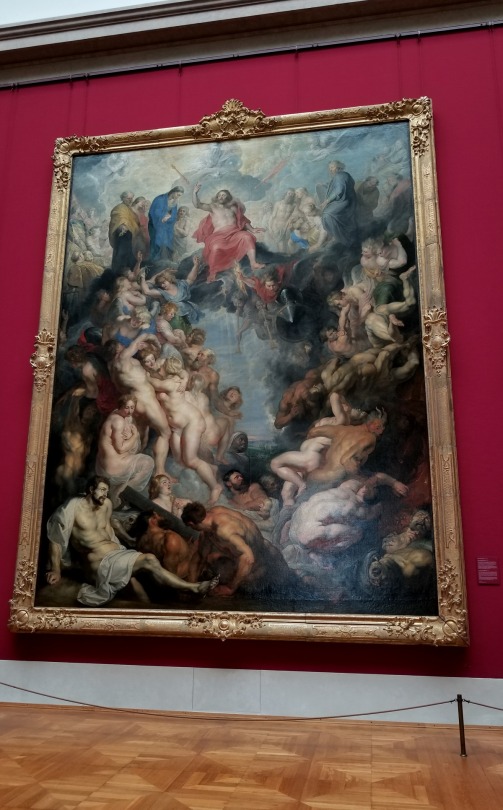
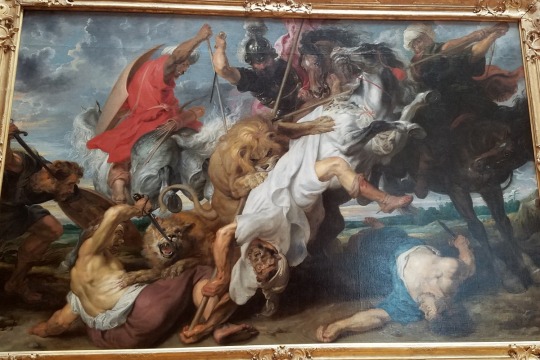
Another highlight of the visit was a massive room filled with epic works by Rubens. Or rather, works by Rubens' students. Rubens was a master of churning out high-priced commissions, and many of these paintings were done almost entirely by his students based on quick sketches by Rubens himself. Delightfully, the museum actually had one of these sketches on display in view of the final product.
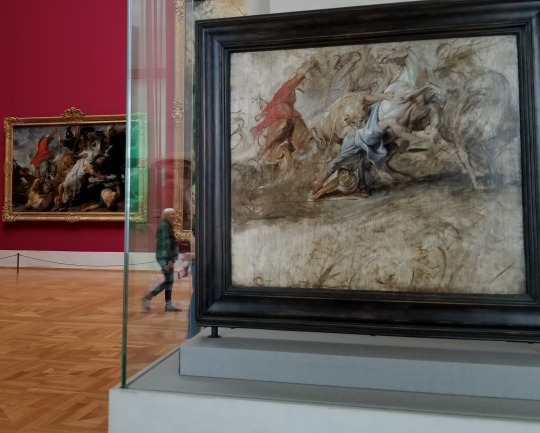
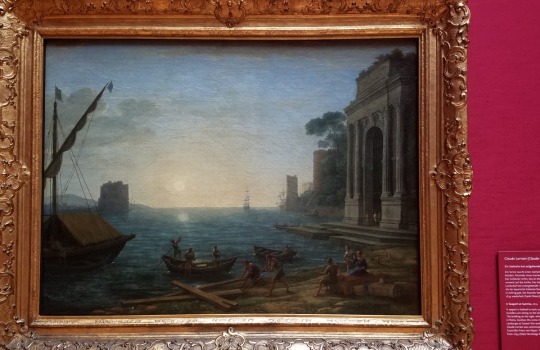
We also saw some more landscapes by Claude Lorrain, a recurring favorite of our museum trips. On our own, we each noticed his paintings from across the room and recognized them instantly by his style. They were hung amidst a collection of other similarly styled paintings, and their placards confirmed that each of these artists were deeply influenced by Claude's techniques.
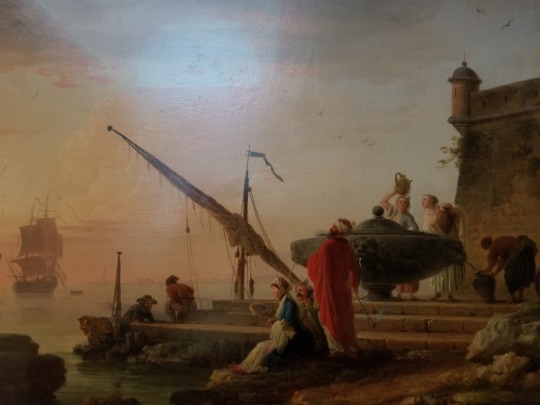
This is just a sampling of everything we saw. We had just about exhausted our museum chops at this point, but I made sure to go back to another room that had previously been too crowded to enter. On loan from the Rijksmuseum in Amsterdam was Vermeer's Woman in Blue Reading a Letter.
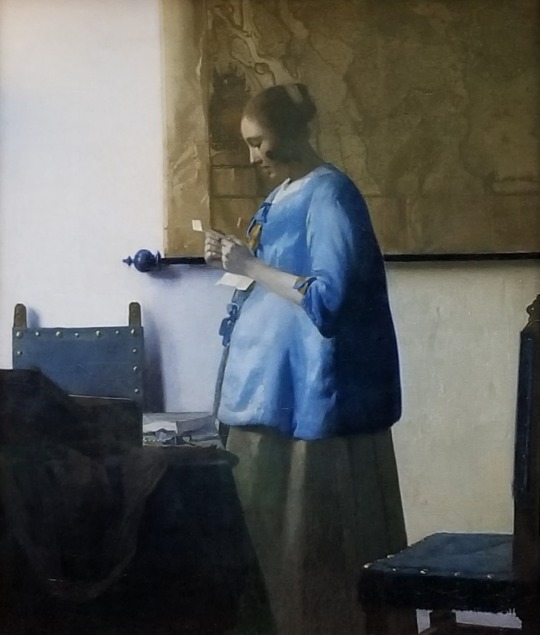
When we visited the Rijksmuseum less than three weeks later, the painting was still on loan, and a simple "Sorry" placard was hung in its place. But we had nothing to feel sorry about, since we'd seen it already.
And that's about all there is to say about our stay in Munich. Apart from our visit to Dachau, of course, which will be coming later. It was one of our favorite cities of the entire trip--right up there with Florence and Edinburgh. The culture, architecture, food, drink, and access to nature are all top-notch, and I can't wait to go back someday.
1 note
·
View note
Note
Bonjour :)
Merci pour ton suggestions, mais Sanukiya est fermé. Nous avons visité les catacombes de paris qui étaient très intéressantes. Et nous sommes très enthousiastes de Paris et France. Malheureusement ma sœur est tombée malade. Elle a un grave mal de gorge et n'a pas de voix. Aujourd'hui, nous sommes allés à l'hôpital. (And that's the extent of my french).
She was called in for treatment right away?? Like it didn't even take 10 minutes. The nurses were very kind and patient with my broken french. It was a bit difficult because they couldn't speak english well and I forgot most about my school-french. Unfortunately it's a virus so antibiotics won't help. But we were suprised they even tested for that. In Germany we were never tested to decide if it's a virus or bacteria. You would get antibiotics even if it's unnecessary... the hospitals have to raise their numbers (all about money...) and only after you waited 6 hours to finally get treated.
In general the french people we met seem very relaxed and not in a hurry, at ease. And like they don't care so much what others do. I've seen many gay couples and openly crossdressing people and people with unique sense of fashion. No one seemed to bat an eye. In Germany people definitively judge you for that or look at you funny. And like the traffic. Didn't hear or see anyone honking yet. They seem to watch out for one another here and don't make a fuss if people make a tiny mistake or take a little to long. In Munich you'll get screamed at if you follow the traffic rules and drive 30 km/h in a school area (which is required!). And every time an ambulance drives by they make room. Why does it work here and not where I live ...
Also people look very nice, like on average they are more stylish and men wearing scarfs looks like normal thing. And dogs, so many dogs :)
And I like the metro very much. I didn't understand how it worked at first. En Allemagne on a 'gare' (?) there are multiple lines and you always have to watch out you don't accidentally get in the wrong one in a hurry. But here it seems you don't have to run to get the trains since the next one comes in 5 minutes again, anyway and only one train per station so you get in the right one too. So well connected and organized (I imagine it's different in the rural areas but I'm comparing it to our inner city transportation. We have a metro too, not on that scale but still).
But I have to say it's very inaccessible for disabled people (or I just missed it). I personally don't need it but I didn't see any elevators or wheelchair accessible areas in the metro. But some lines (Like 11 from Châtelet to Mairie des Lilas) are very adventurous. We don't have to go to Disneyland after that ride ^^ I liked it but my sister was very scared with the rumbling and turning and very fast driving.
Ah yes the catacombs are very well known, I forgot about that, never went yet.
I'm sorry for your sister, I hope she'll be okay nonetheless. Yes there's a policy here where you test whether it's a virus or not because they don't want to waste antibiotics or decrease its efficiency in the long run. "Les antibiotiques, c'est pas automatique" is an old ad made by the healthcare to decrease its abuse. I'm glad you didn't have to wait a long time too!
I admit I have a totally different opinion on the French people in Paris lmao but I suppose that might be the case in some neighborhoods! To me it sounds more like Munich :') Learning how to drive here is a struggle. In the center of Paris tho yeah people are very very stylish, they look great.
Same for subway I dislike it very much lmao the one in Lyon is so much cleaner tbh. Once you got the hang of it tho yeah it's easy to navigate. :) Some subways are definitely more recent than others too.
I'm glad you're having a good time and like the city! If you like France I can only recommend you to try Lyon once, it's another big city that is pretty, or Nice, they're really cool.
0 notes
Text
September 10th, 2021
If I’ve learned anything the past couple years, it’s that when I’m repeatedly not accomplishing something that I want to, it’s best to change the strategy instead of trying to force myself into a method that just isn’t working for me. I’ve often struggled with not being able to just FORCE myself to do things- it’s just a matter of willpower and discipline is it not?? So I spent years spinning my wheels on a lot of things. It’s not a waste of time to try out a new strategy, multiple new strategies, if you’re not making progress anyways. It’s an investment. Once you find something you can stick to, suddenly you’re moving again! And with much less agonizing over it!
This applies to smaller things like this blog, too. We’ve lived together, what, three years? Nearly four? And have not managed to write any of it down (except for the last two a month or two ago.) So, instead of writing in such detail, or alternating going through a trip day by day, or writing you romantic letters (I can just tell you in person now!) I’m gonna just try to write once a month. And I’m gonna write about what I want. I’ll try to cover some missed time, but I’m not gonna stress about it too hard. I’m going to try to remind you to write something once a month too. Long or short, detailed or not, doesn’t matter. What matters is that we have SOMETHING. I value the book I made out of our last blog so much. I’m SO thankful we have a record of the beginning of our relationship, messy bits and all. I want that for the rest of our life too, it’s just so good. And I like the idea that one day a grandchild, or someone even further down the lineage (hello, you!) will be interested in what their ancestors lives were like. I wish I had something like this from mine. I hope these books of ours survive that long. It’s like part of us is still living if our story is being told.
-
Well, gosh. Where do I start now? That’s the problem with leaving off for so long.
We live in Germany, as I’m sure the reader has been able to gather. (Who am I writing to? You still, Robert? Or is this a letter to whoever picks this book up? I don’t know and I probably won’t be consistent about it. You’ll just have to keep up I suppose!)
We live in Germany. You’re stationed here- chose Hohenfels because it’s a chill unit that doesn’t deploy. You still got your EIB while here though! Super proud of you for that. You worked so hard, I don’t think you left work mode at all the entire time, it’s all you thought about. And you did it!
I work at a bank now. Again. It’s not bad, but I don’t like the manager. I won’t waste effort talking about him, but trust me, I have stories. Thankfully we’re about to get a new one. I also met one of my new best friends there. Her name is Jordan, and I’m soooo thankful to have found someone here I really vibe with. It is a tragedy of military life that we will move away from each other sooner rather than later. But it is a perk of military life to have the opportunity to meet people from all over that you never would have otherwise. And it’s a perk of living in this era of easy communication to not have to lose touch.
We love Germany. Like really love it. Like wish we could stay forever love it.
When we got here we arrived late, in the dark. We drove up to a building in the middle of this colorful little gingerbread fairytale town and were told that this was our hotel that we’d be staying in until we had a place of our own. We couldn’t believe it was real.
I can’t imagine a more perfect welcome to Germany. Those first couple months were blissful. We were in a beautiful hotel on the main street of the small town of Velburg- our room sitting on top of the café with homemade pastries, tea, and beer. The beer! It’s as good as they say, truly. Which means a lot, coming from me. Each building was a different color and covered in flowers and vines. Everyone had a beautiful garden. The church at the head of the road rang it’s bells hourly, and our street smelled of wood smoke and fresh bread from the bakery directly across from us. The weather was stunning- bright blue skies and warm sun and a cool September breeze. The food was the best we had ever tasted. The sheep up the road always ran up to us to be loved on. And there were beautiful castle ruins on the hill right above us. The tower has been restored, and we hiked up to it regularly to look out over the countryside. Germany really greeted us with the warmest of hugs.
Now we live in a town called Hohenburg. It’s not as lively, having been cut off from much of the surrounding towns and roads by the base. The buildings on the main street are still bright, but they’re mostly empty, and many of them sag backwards a bit. But I still find it charming. It’s quiet, and feels safe, and there’s a lovely walking path Livvy and I use all the time. And we have our own ruins too! Less intact, but it’s always magical rounding the bend on the way home and looking at our pretty little town with it’s castle overlooking it. Like a fairytale. It’s beautiful around here, year round. My favorite time is early mornings in spring, with everything green and blooming and a cozy fog slowly dissipating in the golden light. I always stop to move snails out of the road. I love it here so much.
-
Ah, you just got home. That makes it harder to write. You’ve been on rotation so have been gone a lot, and have most of today off. If you just wanna play video games, I’ll keep writing, but if not I’ll come back to this tomorrow. Maybe I’ll write more than just once this month. I’m enjoying it.
-
It’s tomorrow! We ended up talking and having a glass of wine and making dinner. My favorite kind of evening with you. I’m so thankful we’re together. The novelty hasn’t worn off.
-
You bought me an electric piano for our anniversary last year. Best gift ever! I really need to set aside more time to play it… I’ve just recently started trying to set aside 30 minutes before going to bed to either read or play piano, but it’s hard to stick to when there’s just oooone mooore thing I could get done. But I think it’s important to try and prioritize that kind of intentional relaxation. I’m trying to learn Gymonopedie no. 1. It’s not actually as technically hard as I thought, the hard part is memorization. It would help a ton if I could read music but… I don’t wanna learn. Maybe eventually.
-
Regensburg was the first city we went to here. We took the train and watched all the storybook towns roll by. Perfect choice. It’s a beautiful place, exactly what you would think of if called on to imagine a classic European city. St. Peter’s was the first cathedral we saw, towering and imposing and intricately carved, impressive in its shadowy heights. But my favorite, forever favorite, was St. Emmeram’s. The beauty touched me in an unexpected way. I’m just going to copy/paste what I wrote about it from Instagram because I put it exactly the way I wanted to then:
“There are conversations to be had about the greed of organized religion throughout history- gold leaf and marble and soaring ceilings while the impoverished of the congregation struggle. Not exactly Christ-like. Not exactly Christian.
But I must admit, these are not conversations I wanted to have inside this building.
There is something in the human soul that is nourished by beauty. And this was, for lack of a better word, heavenly. I could feel the centuries of people seeking out this space for comfort, inspiration, hope. Maybe on their darkest days, desperately looking for something better, higher. I can understand that.
The way the light cascaded from the windows, illuminating each sculpted figure on the opposite wall at sunset. Serene faces gazing benevolently down upon you. Perfect acoustics for the angelic music to envelop and sooth you. Something is larger than you and your problems, there is more to life than this.
It brought tears to my eyes.”
Also- we had the best pasta of our lives in that city. Seriously, every other pasta I ever eat will be compared to that one. Goddamn.
-
Covid limited our travel ability significantly for about a year, which was a bummer. I suppose it would be interesting in historical terms to get into our experience and feelings about that but… not so fun to write. And honestly, we were lucky. It didn’t affect us all that much. We couldn’t travel, couldn’t hang out with groups, and had to wear masks everywhere (still do on that one). It was hard to get used to but once we did… well that’s just how it was. We were still working. We didn’t get sick, no family or close friends got sick, so were alright. And we got vaccinated fairly early on. So we were lucky. Anyway. The POINT is that we haven’t been able to go to as many countries as we would have liked to. But we managed to see a lot in Germany, and we’re beginning to cross borders again this year, which is exciting.
It’s so easy to see amazing things here. You don’t have to go very far at all to see something beautiful or ancient or both. We’ve seen countless castles, ruined and restored. We’ve gone to the oldest monastic brewery in the world and sampled the beer and liquor. We visited Munich and toured the palace and drank and the massive beer hall. We’ve toured museums and gotten tattoos and tried all the limited vegetarian options Germany has to offer. We hiked up to a castle on my birthday so you could take pictures of me in a fancy dress through the fog. We’ve gone on many walks and taken a cable car up to the highest mountain in Germany… it was cloudy but still impressive. We got to experience Christmas markets our first year here, which I absolutely adore and I really hope they come back soon. We go out to dinner with friends, have big beers or ouzo shots with a feast. We have parties and host D&D nights and sometimes go to a lake. We’ve built a little community here like we didn’t bother to do in North Carolina. You got another promotion, I’m planning our wedding (we postponed again). We’re happy. Really happy.
We joke about how everyone says the first year is the hardest, oh wait no, the second year is when reality really sets in… oh well just wait til you have kids!! But it’s so easy. It’s so easy to live with you and love you. Every night is a slumber party still. I’m still happiest when you’re around. You’re still my very best friend. Nothing tops just talking to you.
I suppose our circumstances help, hard to be unhappy with these kind of surroundings! But then again, people are. We see it all the time. Doesn’t matter where you live when your relationship sucks. I’m thankful for you. Everything turned out so well for us, its wild.
-
There are so many trips to write about! It’s a bit overwhelming. I feel like I’ve given us a pretty good start though, so perhaps that’s a next time kind of thing. I’m excited to see what you start us off here with.
0 notes
Text
The Partnership
by Wayne Lerner
9:30 am. It was already 95 degrees with a 1000% humidity. And it was only mid-June.
When I moved to St. Louis from Chicago in 1990 to take my first CEO job at The Jewish Hospital of St. Louis, I traded a lousy winter for an unbearable summer. 3 dress shirts a day to go with my suit. One more when I had an evening function to attend.
I was gazing out the office window past the busy 4 lane Kingshighway bordering Forest Park, a public oasis within the city, larger than Central Park in NY, when my assistant, Jean, came barging in.
By nature, a very complacent person, she was bouncing out of her shoes with excitement. A cup of coffee in one hand and the mail and my phone messages in the other, she handed me a letter, shouting, “You have a letter from the White House! You need to open it right now. It might be important.” The daydream about taking a walk on one of the 3 mile paths constructed around the park’s two golf courses would have to wait.
An understatement, for sure. Jean was known to the staff as Miss Reserved. She downplayed whatever crisis we were currently facing. Nothing fazed her. This time was different.
I looked at her like she was crazy.
“Why are you looking at me like that?” she exclaimed.
“Why would the White House send me a letter?”
“Open the damn letter already! If you don’t, I will!”
I opened the letter. Sure enough, it was an invitation from the First Lady, Hillary Rodham Clinton, to visit the White House.
Unknown to me, Mrs. Clinton had developed a close relationship with the First Lady of Latvia. She was going to be in DC to attend a special athletic event for people with cognitive and physical disabilities, representing her country.
Mrs. Clinton’s letter asked us to come to the White House for a signing ceremony initiating a partnership between healthcare centers in the United States and Latvia. The US partners included The Jewish Hospital of St. Louis; our parent organization, the BJC Health System; and our affiliate, Washington University Medical School.
About a year prior, several members of our medical staff took it upon themselves to convince our management team and Board to establish a relationship with The Jewish Hospital of Riga, Bicur Cholim. The hospital had been seeking international partners to help it meet the pressing needs of its patients.
As a Republic of the Soviet Union, businesses, including hospitals and medical schools, were owned and operated by the government which spent little time or resources on the health of its population. When Latvia regained its independence in 1991, these organizations reverted back to community oversight. Given our Mission and commitment to the ideals under which our hospital was founded, we readily agreed. We would be working with the Republic Children’s Hospital, the City Maternity Hospital and Bicur Cholim to address daunting Maternal and Child health needs.
As you might imagine, we were not given a lot of time to prepare for this amazing event. The signing ceremony was to take place in 4 days.
Jean and I spent the day making phone calls to invite selected individuals to join us in Washington. We could not bring everyone who wanted to attend as the White House gave us a firm limit. Thus, our focus had to be on the physicians who initiated the partnership idea and a few leaders from the hospital and Medical School.
To avoid any travel delays, we flew to DC the night before the signing. Checking into the hotel, our excitement got the better of us. Sleep did not come easily after a night of eating, drinking and lots of laughing.
Much to our surprise, some of the Board members were actually quite funny fellows. The chairman of the board went out of his way to needle the CEO about his attendance at work. “You know, Frank, I am convinced that you have never missed a meeting held out of town. In fact, I think you’re a magnet for national and international meetings. I sure hope you’re taking vacation time for all of these boondoggles.”
Frank just smiled as he turned crimson. After all, what else could he do? The truth was the truth. And we all roared in delight to see our boss being taken down a few notches.
Prior to the signing ceremony and at the request of the Latvian Ambassador to the United States, we were to attend a celebratory lunch at the Hay-Adams, a well known and classic hotel.
Arriving at the hotel, we were shown to the Private Dining Room. A long table was set in an elegant style with more silverware and glassware than one normally saw at lunch. We walked past the US and Latvian flags to our seats where engraved name cards had been placed. Each was embossed with the Latvian seal. Candles burned bright from the elaborate candelabras even though it was mid-day. With a view of Lafayette Park and a grand ornamental fireplace dominating the room, each of us felt a sense of awe about the event soon to take place.
When the time drew near for the lunch to begin, we stood behind our chairs as the Latvian delegation entered the room. The First Lady of Latvia and the Ambassador led the entourage followed by various governmental officials.
The First Lady and the Ambassador asked us to be seated as they welcomed us to the luncheon. They thanked The Jewish Hospital physicians for their foresight in initiating the partnership and then spoke, in sweeping terms, about the great things they hoped would happen.
Due to underfunding and in attention by the prior government, healthcare services were disorganized which allowed significant health issues to arise. Infant mortality had skyrocketed, women were not able to receive adequate prenatal care and children were not able to get the requisite immunizations which made them prone to many diseases. The challenges to fixing the system were daunting.
Before lunch was served, The First Lady asked each of us to introduce ourselves and talk about how the partnership could bring benefit to both countries. The First Lady and the Ambassador were the last to speak.
The First Lady gave an emotional speech about the historical problems of delivering high quality Maternal and Child health care in Latvia and expressed her delight at what was likely to happen as a result of our new relationship. Then, she turned to the Ambassador who introduced himself and began to give his prepared remarks.
“Welcome, colleagues, my name is Ojars Kalnins. I am thrilled to be here to witness the beginning of a major undertaking for our two countries.”
Ojars Kalnins! There can’t be two people in the world with that name!
I was in shock.
The blood drained from my face and I turned pale. The Chairman of The Jewish Hospital Board leaned over and, in a whisper, asked me if I was ill. I was unable to speak.
If I was right, the Ambassador and I attended Austin High School on the westside of Chicago in the mid 60’s. He was the captain of the track team for both his junior and senior years.
I don’t remember anything he said that day. I was in another world. I looked at him and tried to roll back the years to see if I could recognize him from so long ago.
What are the odds that I, a lifelong Chicagoan, would leave to take a job in St. Louis; that the Latvian government would move to independence from the Soviet Union around that time; that a partnership would be established between our hospitals and countries; that we would be invited to the White House for a signing ceremony; and that one of the Latvian senior officials hosting the event was someone with whom I had gone to high school many years before?
Are things pre-ordained or was this fate, serendipity, karma?
I don’t think it really matters. What was really important is that, through our collective efforts, we were joining together to improve the health of moms and babies in a country which needed our help.
After the luncheon, I approached Ojars and asked, “Mr. Ambassador, what was Austin High School’s mascot?”
He looked at me, puzzled. He did not recognize me. I laughed and explained our connection. Ojars and I were not close friends, just classmates. It took a minute, then smiles all around, we began to reminisce about our experiences on the west side of Chicago in the ‘60’s.
“What happened to you during the riots?” I asked. “How did you end up becoming the Ambassador? I have a thousand questions.”
“I was able to avoid the aftermath of the riots because my family moved out of the area about the time I began college at Roosevelt,” Ojars said. “You may not remember but I graduated 6 months before you. While I was born in Munich and came to America when I was 2, my family roots were in Latvia. After getting my degree and working in various capacities, the opportunity came that I could help Latvia establish a new government. As they say, the rest is history. What about you?”
“We didn’t move out of Austin until 1969 when we were finally able to sell our house. We were the last white family on our block. Living there got increasingly dangerous for my family. Needless to say, the impact of the riots are always on my mind. I went to Illinois and then to Michigan for graduate work. How I became a hospital administrator is another story.”
About that time, we had to leave for The White House. The ceremony in the East Room proceeded without incident. Many pictures were taken with our new partners and Mrs. Clinton which were picked up by the national and international media. We were the first such US health care partnership of this kind. I was sure I would never hear or see Ojars again after the ceremony. He said he had to go back to Latvia and I was headed back to St. Louis.
Now, there’s a lot more to tell about the event at the White House, like how the CEO of the system and I stole monogrammed matches and towels from the White House bathrooms and what happened when I asked the Marine Band to play some Grateful Dead or Moody Blues when I entered the special guest entrance at the White House, but those will have to wait for another day. As will what happened when Ojars and I reestablished our relationship through the Austin High School alumni website just a few months ago.
0 notes
Text
Atlas: Heart
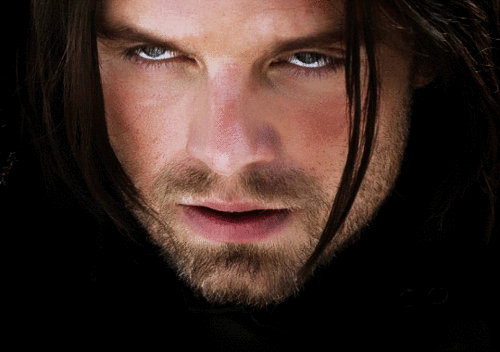
This is my very first Bucky imagine on this blog and I am so excited about it! I love Bucky and Seb but just never really had an opportunity to write for either. Also, I know that it has been a crazy long time since I’ve posted anything, so I’m going to make this one pretty long to make up for it. I had originally planned to have this out yesterday, but I got caught up because it wwas my birthday and never got the chance. Anyways, hope you enjoy!
-H
Pairing: Bucky Barnes x Reader
Words: 1,814
Rating: PG
Warnings: Kinda angsty, but other than that, none
Song: Atlas: Heart by Sleeping At Last
I’m short of breath
Standing next to you
I’m out of my depth
At this altitude
Bucky was always on the run. After Washington, nowhere was safe as long as he was in reach of HYDRA.
He took a plane to Munich, Germany, but didn’t stay there long, as the memories from the War were taunting him. Slowly but surely,he made his way to Bucharest, Romania, where he finally felt okay. Not safe, he was almost certain that he’d never feel safe again, but he felt okay, which was the best he would get after Hydra.
He found a small apartment in the city and laid low for as long as possible, only going out when he needed groceries, and occasionally he would take a stroll through the market, buying fresh plums and when he had a sweet tooth, some tarts.
He hadn’t truly taken in his surroundings in Bucharest. Sure, he’d walked the streets and gazed up at the architecture and visited the a few parks, but he didn’t know anyone.
Sometimes when he was in public he would pick up on names of others, but only by what the people with them called them. He knew the man that always sold him plums as Mr. Ciora.
His next-door neighbour was Mrs. Henderson, who was an elderly Englishwoman whose apartment always made the halls of the complex smell like cookies.
Other than that, there wasn’t really anyone else that he knew- not that he really knew them anyway.
It was a Wednesday morning when he finally made contact with someone besides the friendly smiles he sent to those who greeted him. He was headed out for his weekly trip to the market when he was shoved backwards by a large box, carried by two legs beneath them.
“Sorry!” The box chirped, lowering to the ground to reveal a woman’s face. She gave him a crooked grin as she made met his eyes.
Bucky felt lost for words. Her eyes sparkled as she smiled at him and her skin practically glowed. His breath caught in his throat, and his heart began beating faster.
“It’s- uh, it’s okay,” he muttered, keeping his gaze low.
“I’m just moving in, I’m just upstairs.” She told him, motioning to the rather heavy looking box.
Bucky only nodded in response.
“I’ll just be on my way then,” she excused herself, no longer able to stand the awkward tension. She heaved the box into her arms and slowly struggled up a few steps.
He considered continuing on with his journey to the market, but there was something pulling him towards the woman.
“Wait,” he called after her. “Let me carry that for you.”
She turned and looked at him as he pulled the box from her grasp. “Oh, thank you!”
The walk up the stairs was silent until the two began up the second flight.
“I’m (Y/N), by the way.” She moved to shake his hand, only to pull back after she realized that his hands were full.
Bucky considered giving you a fake name, but he felt a connection towards you. He almost told you his nickname, the name he’d gone by for his whole life, but he wanted a fresh start. He made a quick decision.
“James,” he smiled.
Like the world makes sense
From your window seat
You are beautiful
Like I’ve never seen
Since that day, Bucky had some sort of a bond with you. He found himself excited to see you everyday, and it became a routine for you to go get coffee every morning together.
He had a difficult time remembering most things, but he knew that he was quite the ladies man back in the forties, and he knew that he would remember someone who spun his world like you did. But he didn’t. You were the most beautiful woman he’d ever seen.
You became close, and soon enough, his apartment was vacant for the most part, as he began spending most nights with you.
Only three months after knowing you, your relationship became more intimate and Bucky found himself unable to sleep without you, and you were the same.
Go ahead and laugh
Even if it hurts
Go ahead and pull the string
What if we could risk
Everything we have
And just let our walls cave in
Bucky was scared- no, he was terrified. He hadn’t been so open with anyone since the before he’d been taken by Hydra. He was scared to be so exposed to you, and he was scared for the consequences that may follow.
He began to push you away, much to your dismay, but that didn’t last for long, as you’d called him out after a day of his coldness towards you.
This lead to now, where you sat on your shared bed, holding Bucky as he cried.
You lifted his head and wiped the tears from his cheeks. “James, what is wrong?”
“(Y/N), there is something I need to tell you.” He sniffled. “I haven’t been completely honest with you.”
Confusion covered your features. “James, what are you talking about?”
He opened his mouth to tell you, but stopped when he thought about the danger he could be putting you in.
“I- uh, I had a falling out with my best friends back in America,” he began. “His name is Steve, we were in the army together. He’s why I came here.” He continued telling you about the events in DC, leaving out the parts about Hydra and the fact that he’d been in World War II.
“Oh, James,” you hugged him again. “It’s okay, you’re safe here, you’re safe with me.”
Bucky looked up at you and pulled you in for a deep kiss.
I am short of breath
Standing next to you
I’ll be the dangerous ledge
You be the parachute
The blue and green below
Is a masterpiece
But you are beautiful
Like I’ve never seen
It had been two years since the incident in DC, and Bucky was, while still cautious of being in the public eye, happy.
He was in love with you, that’s all he could say. He doesn’t think he could live without you. He felt safe now, as if his previous squabbles hadn’t even existed. HYDRA and Steve often slipped his mind when he was with you.
It had been two years since he met you, almost exactly two years. It seemed almost too good to be true. He couldn’t help but feel like something was bound to happen, so when he saw the headline that framed him for terrorism, he knew he had to leave.
It was strange for him to walk up the stairs to his apartment, and stop on the fifth floor instead of the sixth. Once he entered, he knew he couldn’t go back.
Go ahead and laugh
Even if it hurts
Go ahead and pull the pin
What if we could risk
Everything we have
And just let our walls cave in
You didn’t quite know what to think when you entered your apartment building and found the chaos that had occurred inside of it.
The railing on the stairs was ripped of and dangling over the edge, and there were chunks of concrete thrown in various places around the building.
What scared you the most was when you reached the fifth floor, where Bucky’s original apartment was. The door was missing, and the second you entered, you dropped the grocery bags from your arms.
Everything was thrown out of place. It seemed as if a tornado had ripped through, destroying everything in its path.
“James?” You whispered, although you knew there would be no answer.
What had happened? Why had it happened?
These questions ran through your head, you you couldn’t wrap your head around any realistic answers.
You glanced at the brown bags on the floor, which were now oozing from the eggs that had broken in the fall.
You sighed and stepped over it, stumbling up the stairs. You wouldn’t allow a single tear to fall before you reached your apartment, and once you did, there was no stopping them.
Go ahead and laugh
Even if it hurts
Go ahead and pull the pin
What if we could risk
Everything we have
And just let our walls cave in
Bucky stared at the white floors of the lab. Memories of you flashed through his mind like they were being biffed at him.
“You sure you wanna do this?” Steve asked from beside him.
“I think it’s best for everyone if I do,” he told him. “But there’s something I need you to do for me.”
“Anything, pal,” Steve stared at him, encouraging him to share his request.
Bucky sighed before opening his mouth to share the secret that he’d kept from everyone since being tossed back into the world of HYDRA.
Let our walls cave in
It had been five months since James went missing. When you had called the police, all they told you was that your boyfriend had been a wanted man.
With that information, you avoided leaving your apartment unless it was necessary.
You practically lived in the shirts that he had left behind. You had noticed that almost nothing of his had been touched, so he must have had a bag ready. Had he been planning on leaving this whole time?
A knock on your door pulled you out of your depressing thoughts. You slowly hobbled over to the door and opened it just enough for you to poke your head out.
You were met with a tall man wearing a leather jacket and a ball cap.
“Are you (Y/N)?” He asked.
“Yes,” you answered. “Who are you?”
“I’m Steve,” he introduced, making you perk up. “I’m a friend of Buc-James’.”
The expression on your face made him let out a breathy chuckle. “I guess I have some explaining to do.”
You opened the door wider, letting him see the rest of you. “Yeah, me too.”
He stared at how you caressed your stomach, the shirt you were wearing hid it a bit, but your bump was still very visible.
“Good Lord,” Steve whispered.
Let our walls cave in.
53 notes
·
View notes
Text
10 Interesting German Novels
Siddartha by Hermann Hesse: “Though set in a place and time far removed from the Germany of 1922, the year of the book’s debut, the novel is infused with the sensibilities of Hermann Hesse’s time, synthesizing disparate philosophies–Eastern religions, Jungian archetypes, Western individualism–into a unique vision of life as expressed through one man’s search for meaning.It is the story of the quest of Siddhartha, a wealthy Indian Brahmin who casts off a life of privilege and comfort to seek spiritual fulfillment and wisdom. On his journey, Siddhartha encounters wandering ascetics, Buddhist monks, and successful merchants, as well as a courtesan named Kamala and a simple ferryman who has attained enlightenment. Traveling among these people and experiencing life’s vital passages–love, work, friendship, and fatherhood–Siddhartha discovers that true knowledge is guided from within.” (Amazon)
A Well-tempered Heart by Jan-Philipp Sendker: “Almost ten years have passed since Julia Win came back from Burma, her father’s native country. Though she is a successful Manhattan lawyer, her private life is at a crossroads; her boyfriend has recently left her and she is, despite her wealth, unhappy with her professional life. Julia is lost and exhausted. One day, in the middle of an important business meeting, she hears a stranger’s voice in her head that causes her to leave the office without explanation. In the following days, her crisis only deepens. Not only does the female voice refuse to disappear, but it starts to ask questions Julia has been trying to avoid. Why do you live alone? To whom do you feel close? What do you want in life? Interwoven with Julia’s story is that of a Burmese woman named Nu Nu who finds her world turned upside down when Burma goes to war and calls on her two young sons to be child soldiers. This spirited sequel, like The Art of Hearing Heartbeats, explores the most inspiring and passionate terrain: the human heart.” (Barnes and Noble)
The Eighth Life by Nino Haratischvili: “At the start of the twentieth century, on the edge of the Russian empire, a family prospers. It owes its success to a delicious chocolate recipe, passed down the generations with great solemnity and caution. A caution which is justified: this is a recipe for ecstasy that carries a very bitter aftertaste. Stasia learns it from her Georgian father and takes it north, following her new husband, Simon, to his posting at the center of the Russian Revolution in St Petersburg. A ballet dancer never makes it to Paris and a singer pines for Vienna. For twenty-four-year-old Eva Bruhns, World War II is a foggy childhood memory. At the war’s end, Frankfurt was a smoldering ruin, severely damaged by the Allied bombings. But that was two decades ago. Eager for her wealthy suitor, Jürgen Schoormann, to propose, Eva dreams of starting a new life away from her parents and sister. But Eva’s plans are turned upside down when a fiery investigator, David Miller, hires her as a translator for a war crimes trial. Though it means going against the wishes of her family and her lover, Eva, propelled by her own conscience , joins a team of fiery prosecutors determined to bring the Nazis to justice—a decision that will help change the present and the past of her nation.” (Barnes and Noble)
The Book of Dreams by Nina George: “Henri Skinner is a hardened ex-war reporter on the run from his past. On his way to see his son, Sam, for the first time in years, Henri steps into the road without looking and collides with oncoming traffic. He is rushed to a nearby hospital where he floats, comatose, between dreams, reliving the fairytales of his childhood and the secrets that made him run away in the first place. After the accident, Sam—a thirteen-year old synesthete with an IQ of 144 and an appetite for science fiction—waits by his father’s bedside every day. There he meets Eddie Tomlin, a woman forced to confront her love for Henri after all these years, and twelve-year old Madelyn Zeidler, a coma patient like Henri and the sole survivor of a traffic accident that killed her family. As these four very different individuals fight—for hope, for patience, for life—they are bound together inextricably, facing the ravages of loss and first love side by side. A revelatory, urgently human story that examines what we consider serious and painful alongside light and whimsy, THE BOOK OF DREAMS is a tender meditation on memory, liminality, and empathy, asking with grace and gravitas what we will truly find meaningful in our lives once we are gone.” (Barnes and Noble)
The Little Paris Bookshop: “Monsieur Perdu calls himself a literary apothecary. From his floating bookstore in a barge on the Seine, he prescribes novels for the hardships of life. Using his intuitive feel for the exact book a reader needs, Perdu mends broken hearts and souls. The only person he can't seem to heal through literature is himself; he's still haunted by heartbreak after his great love disappeared. She left him with only a letter, which he has never opened.After Perdu is finally tempted to read the letter, he hauls anchor and departs on a mission to the south of France, hoping to make peace with his loss and discover the end of the story. Joined by a bestselling but blocked author and a lovelorn Italian chef, Perdu travels along the country’s rivers, dispensing his wisdom and his books, showing that the literary world can take the human soul on a journey to heal itself.Internationally bestselling and filled with warmth and adventure, The Little Paris Bookshop is a love letter to books, meant for anyone who believes in the power of stories to shape people's lives.” (Barnes and Noble)
The Art of Hearing Heartbeats by Jan-Phillipp Sendker: “Monsieur Perdu calls himself a literary apothecary. From his floating bookstore in a barge on the Seine, he prescribes novels for the hardships of life. Using his intuitive feel for the exact book a reader needs, Perdu mends broken hearts and souls. The only person he can't seem to heal through literature is himself; he's still haunted by heartbreak after his great love disappeared. She left him with only a letter, which he has never opened. After Perdu is finally tempted to read the letter, he hauls anchor and departs on a mission to the south of France, hoping to make peace with his loss and discover the end of the story. Joined by a bestselling but blocked author and a lovelorn Italian chef, Perdu travels along the country’s rivers, dispensing his wisdom and his books, showing that the literary world can take the human soul on a journey to heal itself.Internationally bestselling and filled with warmth and adventure, The Little Paris Bookshop is a love letter to books, meant for anyone who believes in the power of stories to shape people's lives.” (Barnes and Noble)
The StoryTeller by Pierre Jarawan: “Samir leaves the safety and comfort of his family’s adopted home, Germany, for volatile Beirut in an attempt to find his missing father. The only clues Samir has are an old photo and the bedtime stories his father used to tell him. In this moving and engaging novel about family secrets, love, and friendship, Pierre Jarawan does for Lebanon what Khaled Hosseini’s The Kite Runner did for Afghanistan. He pulls away the curtain of grim facts and figures portrayed in the media and shows an intimate truth of what it means to come from a country torn apart by civil war. With this beautiful and suspenseful story, full of images, Jarawan proves to be a masterful storyteller himself. Pierre Jarawan is the son of a Lebanese father and a German mother and moved to Germany with his family at the age of three. Inspired by his father’s love of telling imaginative bedtime stories, he started writing at the age of thirteen. He has won international prizes as a slam poet, received the City of Munich literary scholarship (the Bayerische Kunstförderpreis) for The Storyteller, and was chosen as Literature Star of the Year by the daily newspaper AZ. His debut novel The Storyteller was a Spiegel bestseller in Germany, proclaimed Book of the Month by the leading Dutch television talk show DWDD, and received unanimous rave reviews from the European press.” (Barnes and Noble)
The Women on the Stairs by Bernhard Schlink: “In a museum far from home, a lawyer stumbles across a painting of a woman he once knew, Irene. Decades before, he had become entangled in her affairs when he was called on to settle a dispute between her husband, who had commissioned the portrait, and the painter of the work—who was also her lover. When, ultimately, the lawyer fell in love with her himself and risked everything for her, she mysteriously disappeared—along with the painting. Now, face to face with the portrait once again, the lawyer must reconcile his past and present selves. When he eventually locates Irene, he is forced to confront the truth of his love—and the reality that his life has been irrevocably changed. A poignant, intricately crafted novel of obsession, creativity, and love, this is Bernhard Schlink at his peak.” (Barnes and Noble)
A Whole Life by Robert Seethalar: “Andreas Egger knows every path and peak of his mountain valley, the source of his sustenance, his livelihood—his home. Set in the mid-twentieth century and told with beauty and tenderness, Robert Seethaler's Whole Life is a story of man's relationship with an ancient landscape, of the value of solitude, of the arrival of the modern world, and above all, of the moments, great and small, that make us who we are.” (Barnes and Noble)
Wetlands by Charlotte Roche: “Wetlands—an international sensation with more than a million copies sold worldwide—has been at the center of a heated debate about feminism and sexuality since its publication last spring. Charlotte Roche’s controversial debut novel is the story of Helen Memel, an outspoken, sexually precocious eighteen-year-old lying in a hospital bed as she recovers from an operation. To distract herself, she ruminates on her past sexual and physical adventures in increasingly uncomfortable detail. The result is a funny, shocking, and fearlessly intimate manifesto on sex, hygiene, and the compulsion to obliterate the covenant that keeps girls clean, quiet, and nice.” (Barnes and Noble)
1 note
·
View note
Text
July 2020
Change. Transition and transformation.
Feeling like a proud mum during my first graduation class’ final exam. They’re all gonna leave the nest so soon.
Meeting my colleagues at Michi’s own “Isar beach”. Ordering truffle pizza. Watching the storm clouds coming closer. Retreating to Michi’s flat. Talking to the dude with the guitar about life-changing travel experiences. Making fun of the stalkers across the street. Psychedelics-talk with Lorenz. Having a last drink at Rosi’s. My first time in a bar in many many months.
Tapas with Lena and Maike. Walking in linen shoes in the pouring rain. Listening to Knorkator on the subway.
New clothes. Loose, high-waisted pants, jeans shorts, a lemon print dress. A graphic, artsy Monki dress. A new hat and a bargain from COS (a sweater for only €5,85, wow).
My spontaneous meet-ups with Manu at the Asian take-away restaurant. Last time I started smiling brightly when a little kid walked past us very proudly with their brand new Schultüte.
Rest. A clean apartment. Cleaning in general (weird obsession atm; I even cleaned Manu’s whole kitchen when I was making veggie stew for him during his ear infection; but also I sang Soft Kitty for him). Gardening. Cooling down with water spray, après sun spray and cool-packs from the freezer.
Leoni’s essay actually made me laugh out loud. We had a bet going on. If she managed to use the word turkey in her essay I would have to give her €10. Well, she did it. Also, she invented and app called Teenage Mutant Karate Cats and signed off with Love, Karen. Such a gem.
That feeling when you put the pen down and the work is finally done. So liberating (after grading the final exams).
My blackroll. The only thing that helps after working at a desk for a few hours. My back hates grading papers. And using the kitchen as a temporary workspace. The smell of coffee, the humming of the dishwasher, sitting right by the window. Using all the colours to mark the essays. I love highlighter pens.
The smoke alarm lady’s charm. I only see her once a year when she comes to check on the smoke alarms but I kinda like her.
Staying late. Singing in an empty school. Not having to be quiet for once.
People standing in for gay rights and diversity. Which is why I loved the Circus of Books documentary. And the Netflix series POSE. Blanca and Pray are my favourite characters, of course.
I was satisfied with the Dark series ending. Couldn’t have hoped for more.
Raspberry plants for only 1€. I couldn’t resist.
Teaching some English lessons in other classes. Not actually facing any resistance, they really liked working with me. They asked questions and were interested, what the heck? In the final lesson with the 9d ladies we actually carved out some time to learn the cup song and sing karaoke on full volume. The girls showed my a Dua Lipa song I hadn’t heard before, I really liked it. And they wanted to hear My Heart Will Go On. Just imagine blasting the Titanic song and a whole group of teenagers singing along as dramatically as possible.
Manu feeding me with Toffifee while watching a brainless rom-com.
A day trip to Chiemsee with Sash. We were ON A BOAT, had Aperol Spritz in the sunshine right by the lake. Lots of walking, talking, inspecting flowers and eating good food. In the end we went swimming (for the first time this year?). How I had missed the water. Browsing magazines on the train. Talking about hair care and secret dreams. Coffee with ice-cream for dinner.
Making snack berries. Dipping blueberries in Greek yoghurt, rolling them in grated coconut and off to the freezer. A great healthy snack. (But of course I’m also obsessed with actual Raffaellos this month.)
A day at the lake with Verena, Silvia and Nicole. Great picnic lunch, 90’s revival music. Spotting huge fishies underwater. Taking photos of Verena in order to work on some ideas for her back tattoo. Low point: stepping into a bee and the worst sunburn ever.
The Karlsfeld train underpass. Lots of interesting underwater creatures that actually look like vintage illustrations.
Westpark. One of my favourite green spots in Munich. Lunch at Gans am Wasser (veggie seitan kebab), walking over to Rosengarten, ice-cream for dessert. Cycling home. Stopping to pick some flowers.
BBQ with some colleagues. Playing some weird trampoline volleyball game. Chasing Luise (the weiner dog) around. Being the DJ. In the end I sat there with Michi, Laura and Nicole. Drove home with a quite drunk Michi who didn’t stop talking.
A picnic with the kids and their parents to say our final goodbyes. Culinary presents from the parents, a graduation T-shirt from the students. Taking lots of photos, talking until it got dark. On the next day I had to go up on stage for the graduation ceremony. I was super nervous but so glad when it was all over. I went home with arms full of flower, wearing my constellation dress. On the parking lot Nicole and I even had a little fun with a helium balloon.
I went straight home to visit my mum on the last school day so I enjoyed a weekend there. Singing with my mum and my brother, healthy meals, inspecting the garden, making a gorgeous bouquet with some sunflowers I had brought with me and buddleja twigs from the garden. Walking through the neighbourhood with my mother, feeding chickens (my mother is just as crazy as me, the video I made of her talking to the birds is proof), going to the fleamarket (also for the first time this year). Meeting Michi U., Sash, Julia, Lena and Obi at Yvonne’s vegan cafe. Iced almond coffee, two full tables filled with vegan food. Talking to the owner about creative projects. Meeting Catrin and Andi at Brillengalerie (Birkenstock inspiration!).
Learning about resonant breathing, medicinal mushrooms and the psychological origin of illness.
Salt with smoky paprika and lemon-infused olive oil.
Harvesting pea pods on my balcony.
Talking to a body therapist. A morning walk through Schwabing. Treating myself to some Bircher muesli and fresh juice. Walking through some stores I had never been to before. Discovering a mirror gallery. Later some vegetarian sushi, Pho and a massage appointment. Lying in bed with Manu, right in front of the ventilator. Eating sinful cookies'n'cream magnum, talking about sex, health, music, life. Making late-night pizza.
Talking to Franzi on the phone. Reading a graphic novel set in Munich. Great drawings of the city. I loved the interior of Pimpernel club. Really well done.
Meeting Laura at her osteopathy practice for the first time. I really like her. Later it turned out that she’s friends with Becky! Laura taught me how to sit and stand and felt her way into my scoliosis.She has such a soft approach, let’s see how happy I’ll be with that treatment. But I obviously need to join her Cantienica class.
Hardware store, heavy plant transport. Finding a lot of cheap flower pots in the antique store.
Eating my first home-grown tomato. Just a little herbal salt. So nice. You can actually taste the sunshine.
Gute Laune herbal tea. In the middle of summer. With the doors closed to keep the heat out.
This tie-dye idea.
I sat on the balcony when a sudden thump made a tiny little bird fall right in front of me. It had collided with my living room window. Its wing was twisted so I put it right and the bird hopped off, resting in a dark corner, closing its eyes all the time. I looked up how to help and was really sad because the internet warned me that most birds would die a few hours after a collision but after ten minutes the bird hopped onto a twig, some more hopping, and flew off. I really hope you made it, little friend! Have a nice summer!
Watching The Expanse with Lena and Obi. Watermelon-Feta salad with mint. Drinking homemade lemonade, sparkly bloodorange wine and coffee with ice-cream.
An electric blue summer dress.
The Russian-themed Sjöden autumn catalogue.
Taylor Swift and Bon Iver - Exile. Such an incredibly beautiful song.
Making a fantastic Indian eggplant/chickpea curry with coriander, paneer and tofu. Delicious.
And the last crazy thing I need to talk about this month is Becky. She texted me during the graduation ceremony on the last day of the school year and told me that she’d be one of my colleagues from now on!! Crazy. The trio is back together. I met her at our usual Italian restaurant and we talked for hours. So much to catch up on. She is still a person I vibe and click with. However, I’m also a little scared because somehow she represents a chapter of my life I have closed. So she seems a little out of place in this new little corner of the world I have created for myself. But I’m sure it’s gonna turn out great!
0 notes
Text
ES Spectre 2.0 Chapter 11-1
5 notes
·
View notes